Sixteen months have passed since we showed you how Google’s algorithm was killing independent websites by favoring big media publishers that were abusing their reputation to sell you bad products.
Since then, Google enforced a new spam guideline called “site reputation abuse” by removing entire sections of major websites from their search index… at least for a few months.
While this drama was unfolding, Google rolled out AI Overviews under the slogan, “Let Google do the searching for you.”
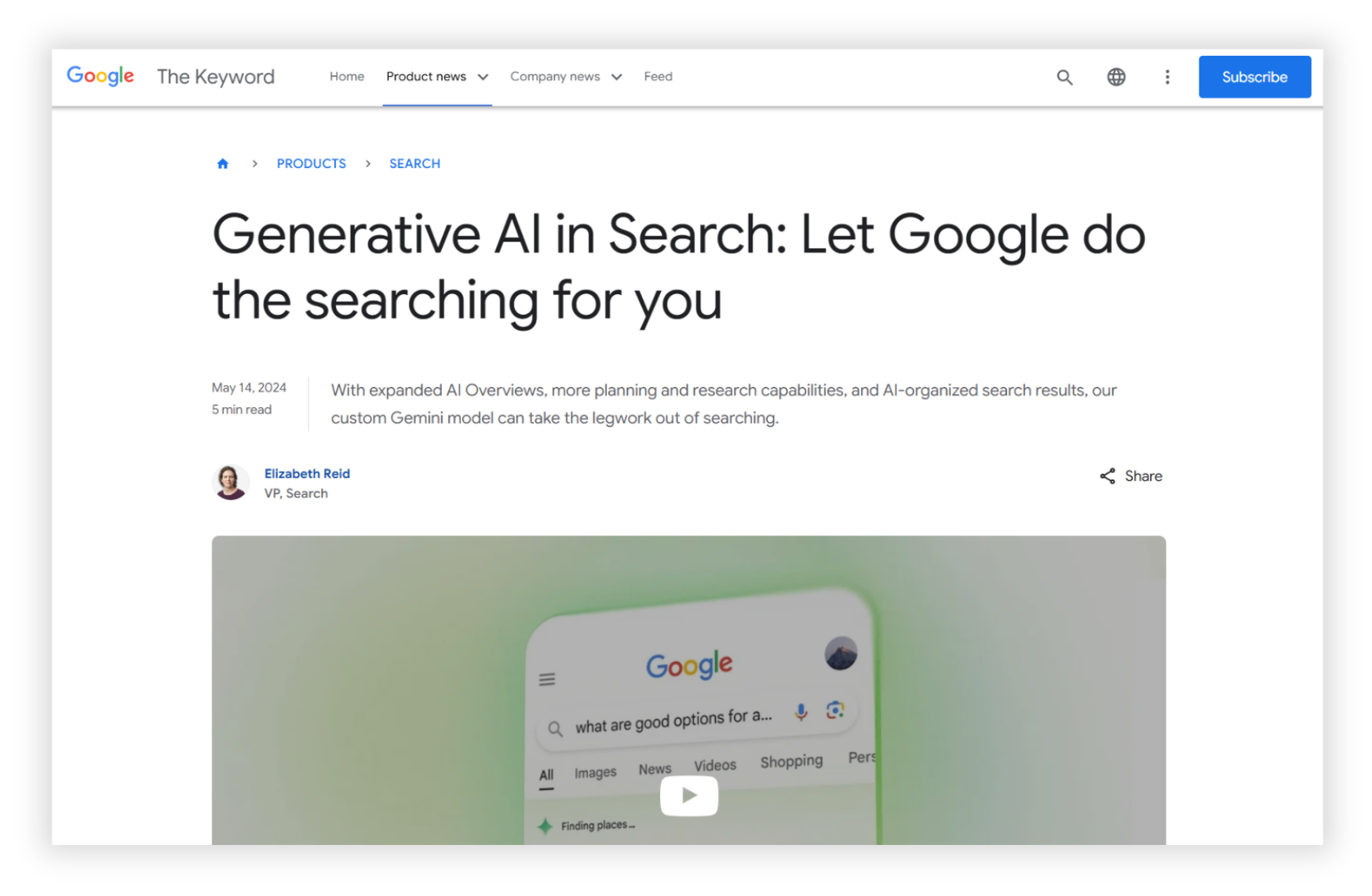
But are AI Overviews leading you to the best results on the web? Or is this just a new prime spot for selling you products you will regret buying? And how does this change affect the websites that made Google’s AI possible in the first place?
To find out, we spent weeks conducting research into air purifiers we reviewed (including models that don’t exist) to determine whether Google Search results and AI Overviews are leading consumers to good advice.
It turns out this rabbit hole is deeper than we thought, with ramifications that span major Reddit communities and could be leading you to scams and defamatory hallucinations.
I hope you’re ready for a long read because this article is packed with examples, fresh data and way too many screenshots.
Google AI Overviews are mining “product facts” from press releases, product listings and sponsored reviews
Don’t bother asking Google if a product is worth it; it will likely recommend buying whatever you show interest in—even if the product doesn’t exist.
We found a problematic pattern after spending hours vetting the sources of pros, cons and overall product recommendations spouted by Google’s AI Overview: most ‘facts’ are sourced from the manufacturer itself, online shops, sponsored articles and press materials.
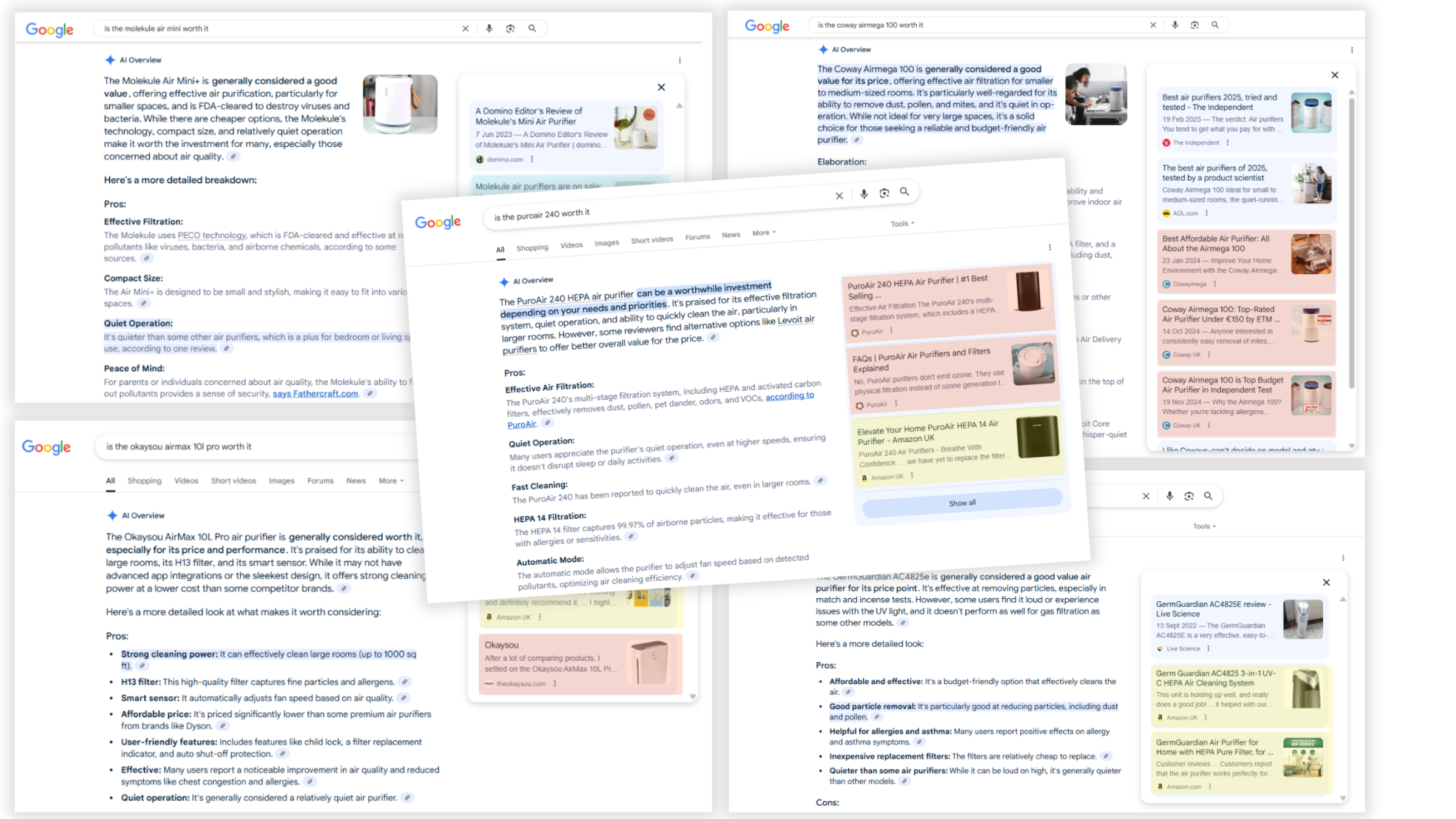
That could explain why AI Overviews used overly salesy language, regardless of what we were searching for.
This was the case even when asking about models that had been deemed as ‘the worst air purifier ever tested’ by The Wirecutter or had been labeled as “not living up to the hype” by Consumer Reports.
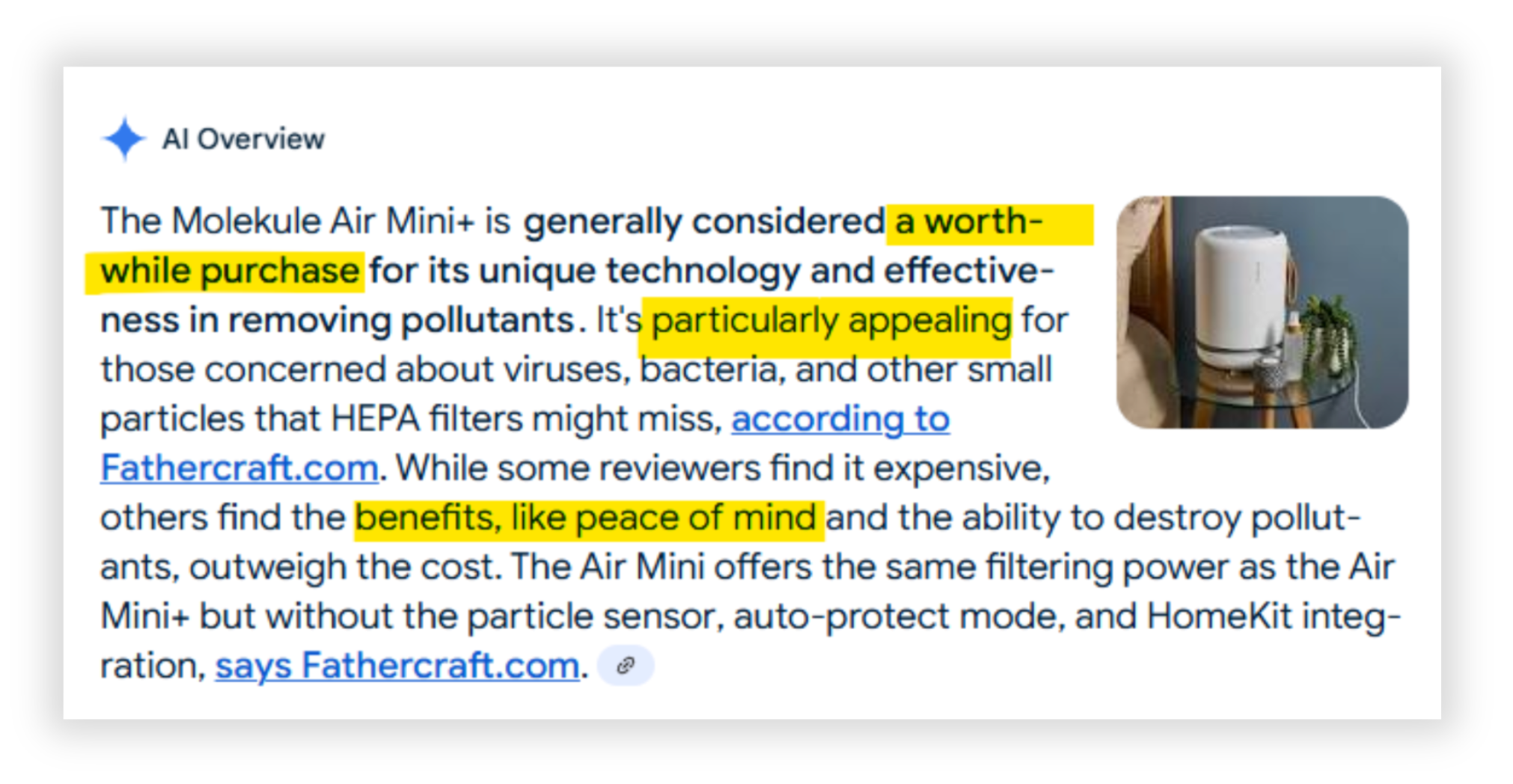
Not only that… We also noticed that the AI Overview failed to include the very same cons that their algorithm had no issue highlighting in organic search results:
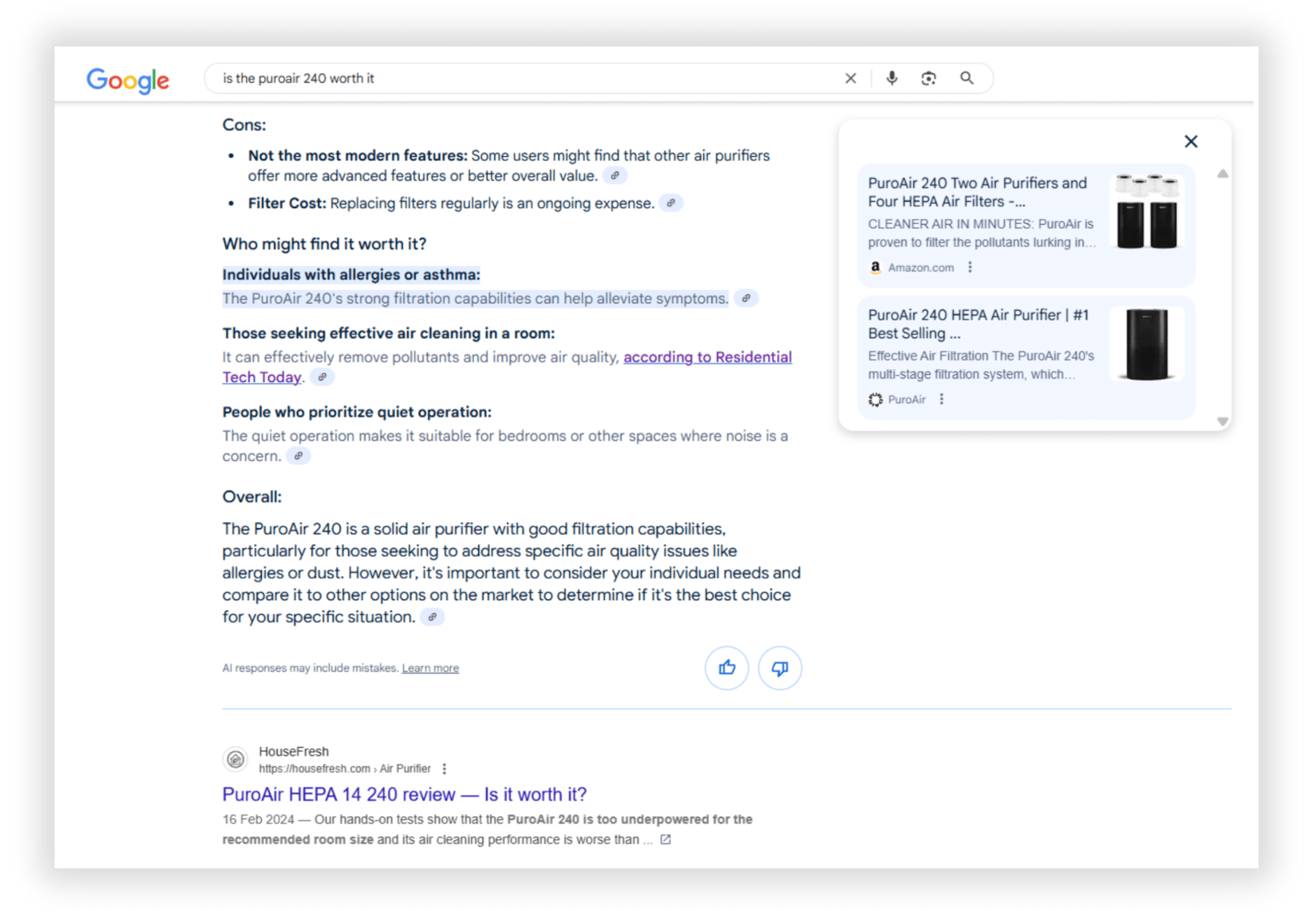
In fact, the overly salesy language would still be there even when we asked specifically about cons:
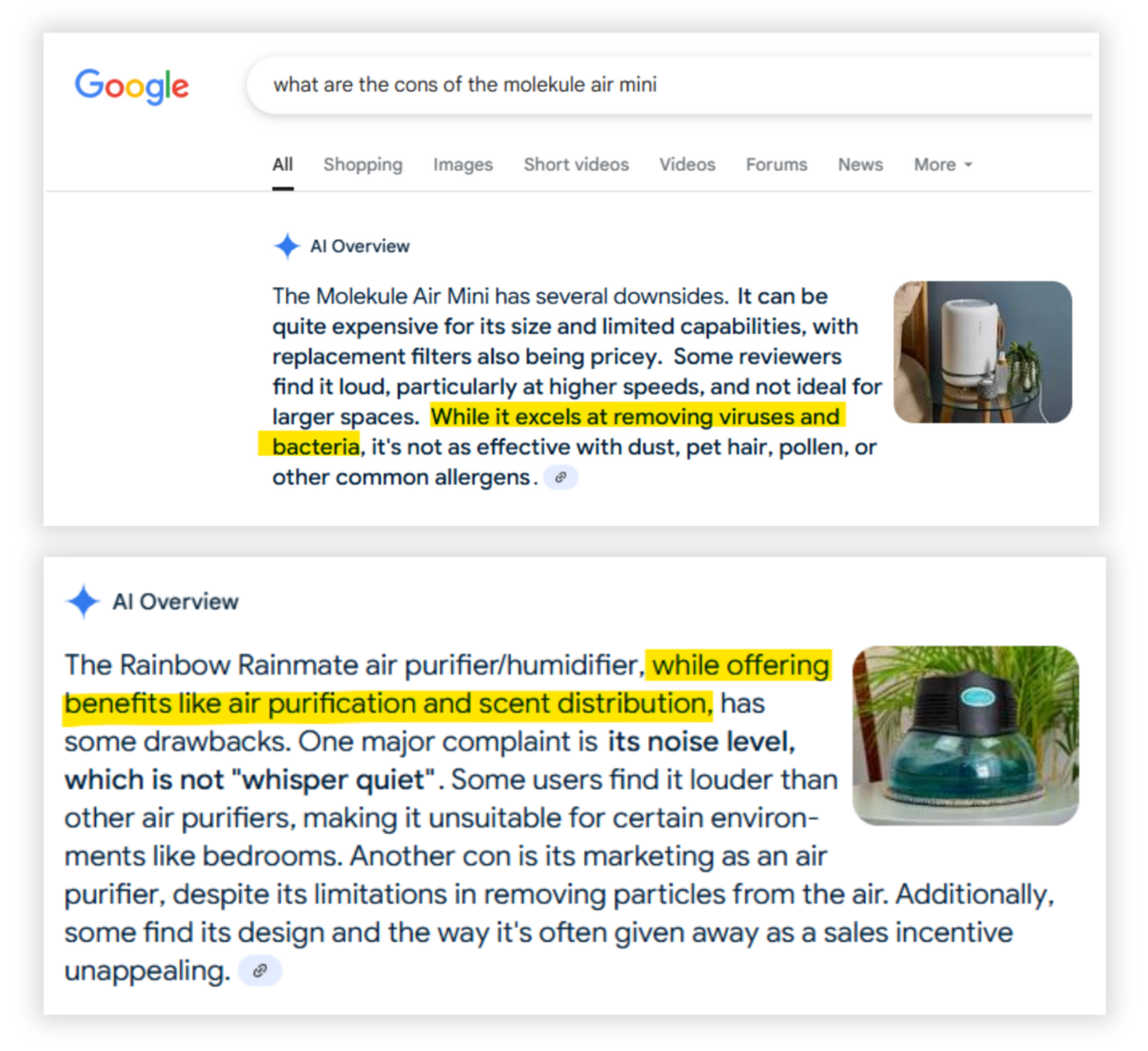
This changed once we switched to requesting ‘a good reason not to buy’ specific models, showing that Google AI Overviews are capable of pulling out critical reviews.
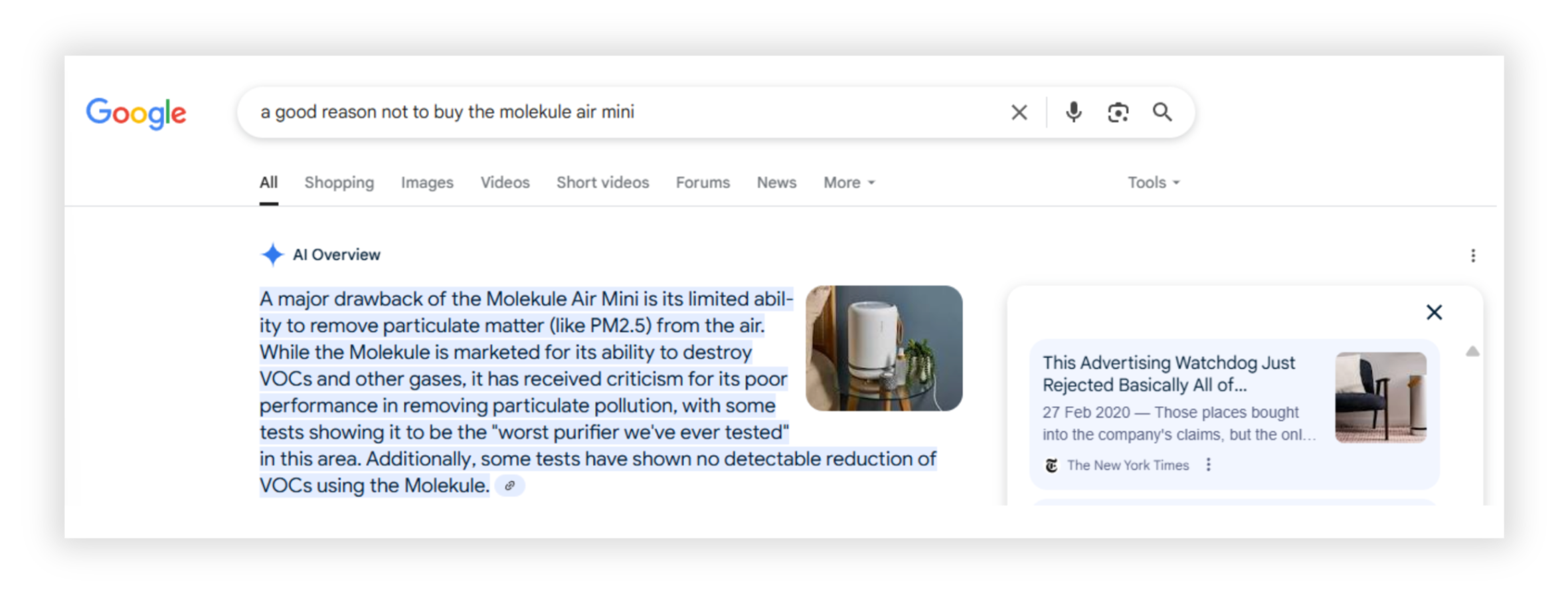
Unfortunately, in many cases, the cons themselves were simply hallucinations, which could be easily confirmed by checking the cited source or the organic search results:
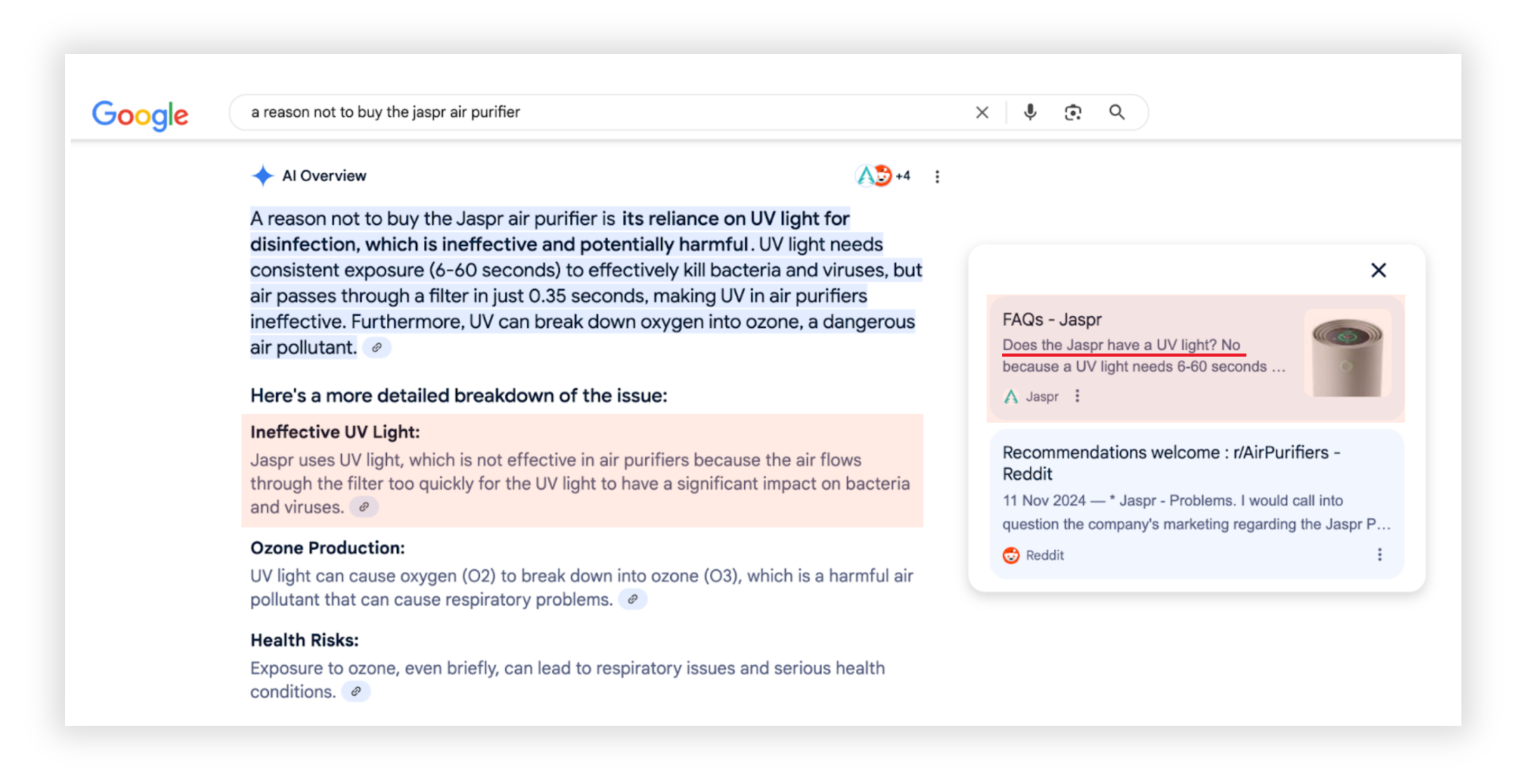
Funnily enough, Google’s organic search results don’t hallucinate—who would have thought.
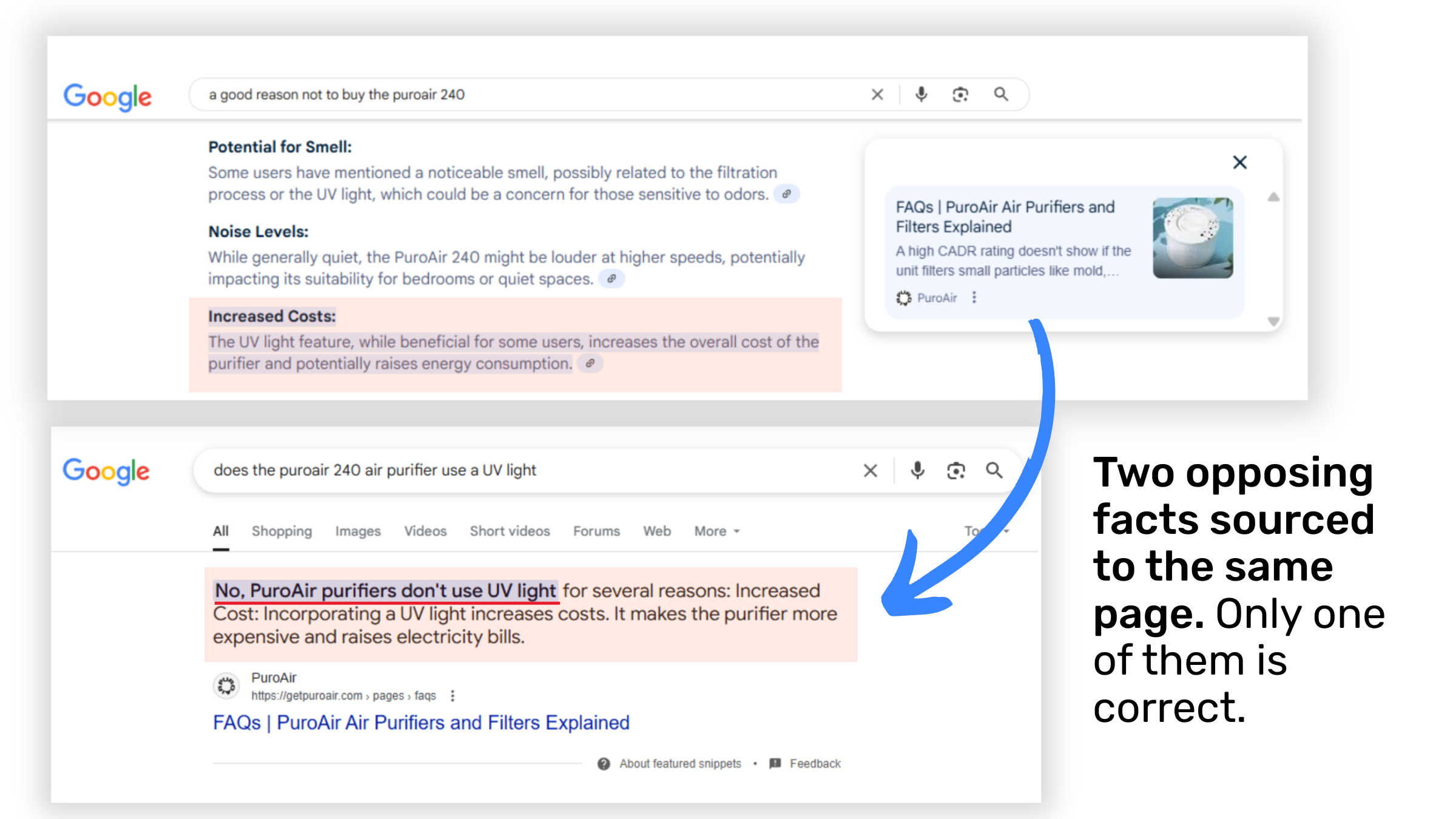
Our tests showed that Google’s AI Overview was positive even when we asked about air purifier models that were completely made up.
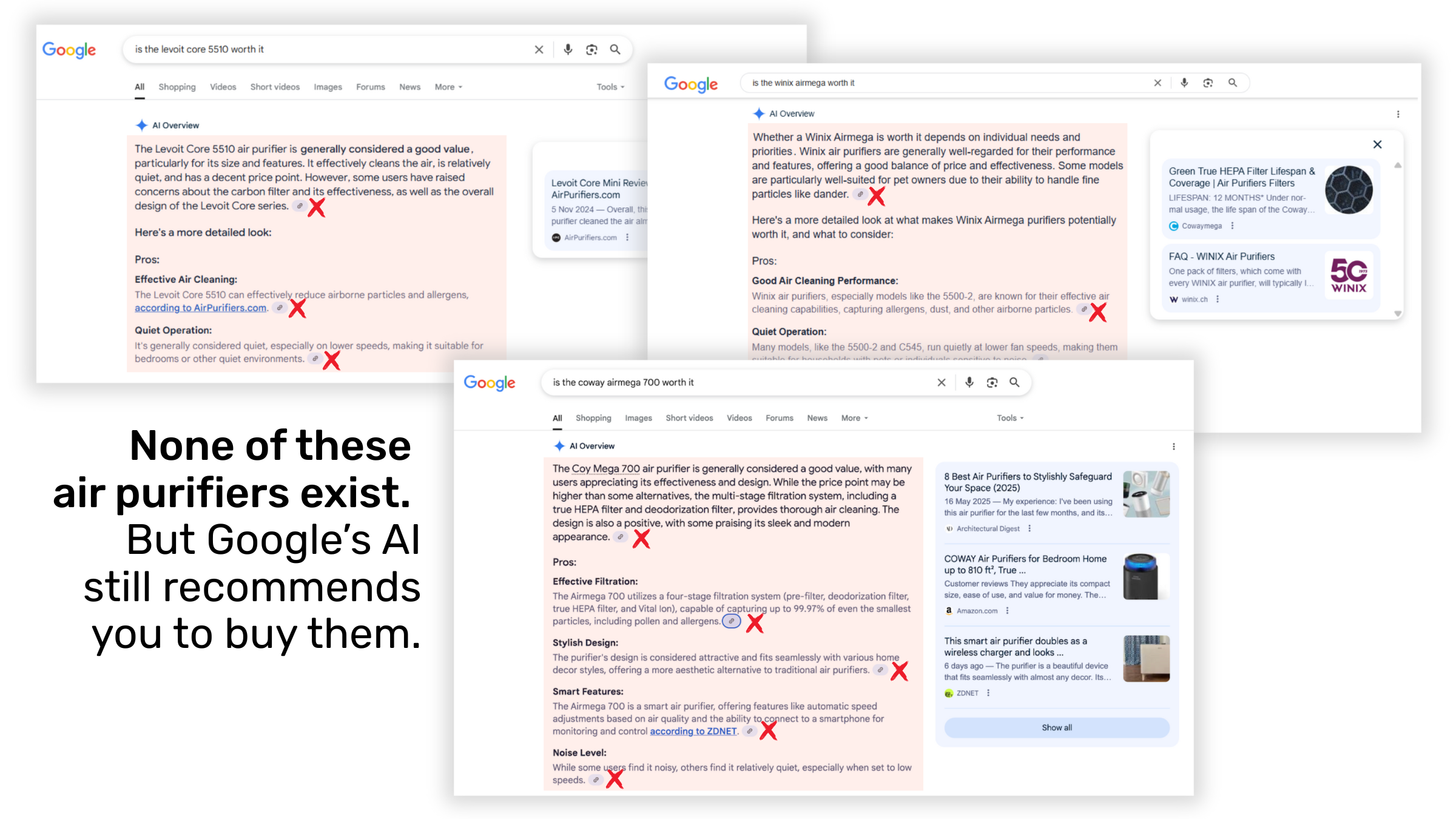
As reported by Jalopnik, “Google […] now relies on an AI that has no concept of “truth” — just repeating words it sees used in proximity to each other, like your phone keyboard’s autocomplete or a particularly dumb parrot.”
The more we searched, the clearer it became that no matter the product, the AI Overviews salesman would always repeat a version of the same script:
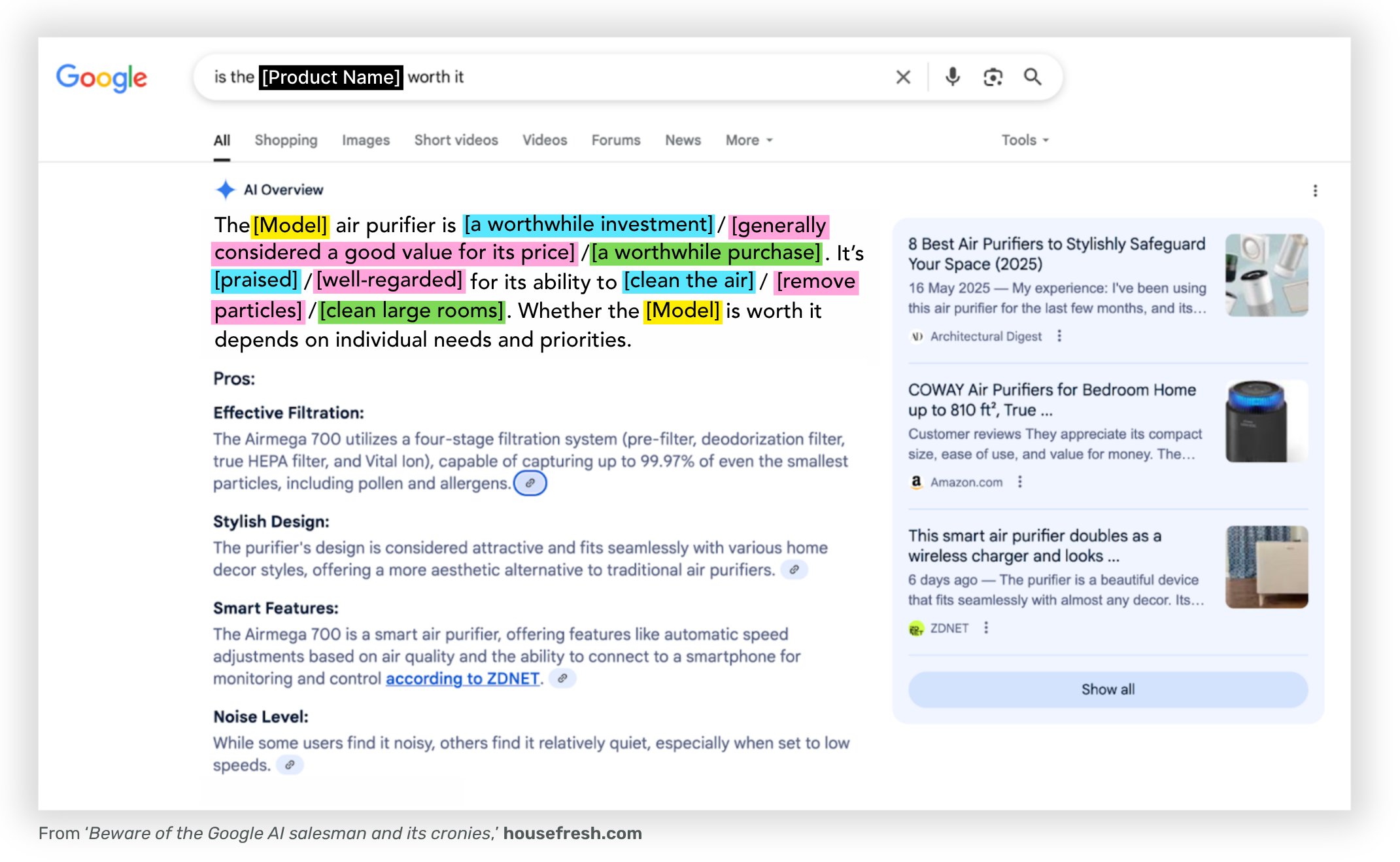
It all started to make more sense once we visualized our data.
43.1 % of the facts cited by AIO came from the product manufacturer. This statistic combines the cases where statements were linked directly to pages on the manufacturer’s website (19.4%) with facts sourced from product listings built with manufacturer-provided data on popular retailer websites (23.7%).
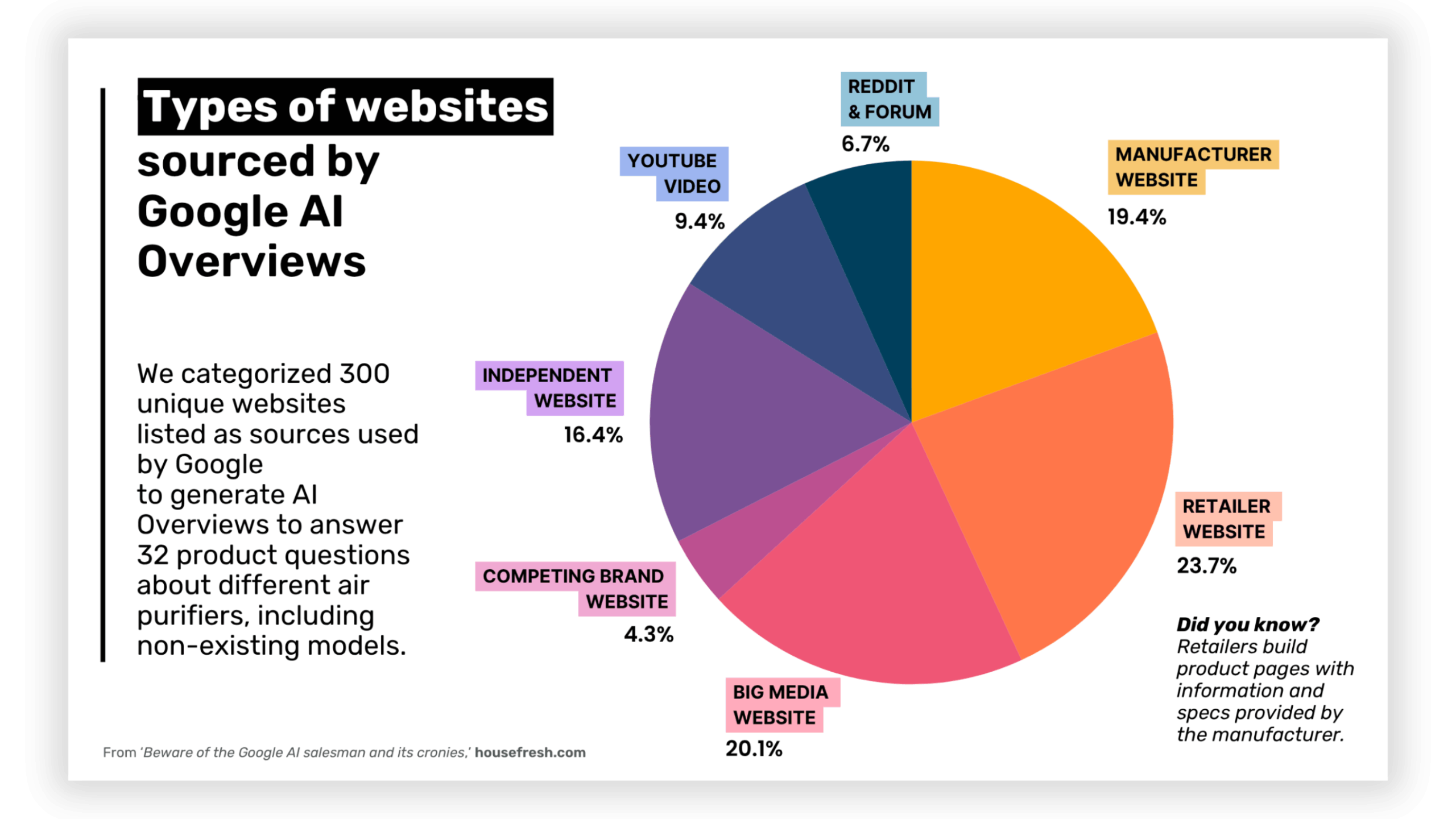
Next, we clicked on every link to assess whether it was relevant to our question and the information presented by the AI Overview. We found that 19.5% of the pages sourced by AIO were irrelevant to the query, with the majority of these irrelevant pages being listed when Google’s AI had constructed an answer to questions about air purifier models that don’t exist.
We also categorized the type of page the AI Overview was sourcing its facts back to and found that a whooping 38.6% of sources pointed to product listings (on the manufacturer website and online retailers) and PR content (including sponsored reviews, sale announcements, press releases and deals coverage on big media sites).
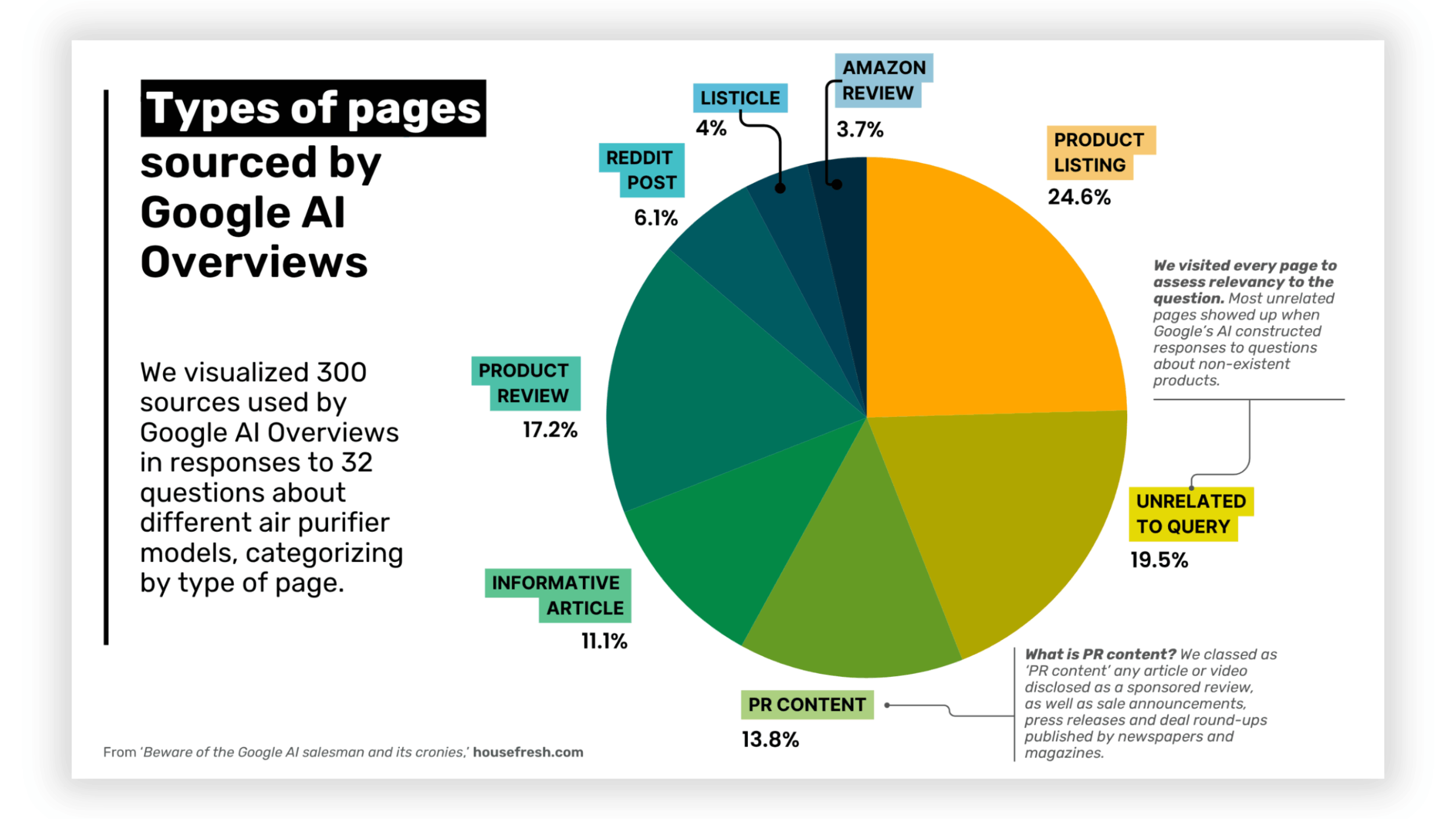
Google’s AI Overviews are regurgitating marketing materials and manufacturer-provided facts, while prominently featuring sponsored product listings on top of their glowing recommendations:
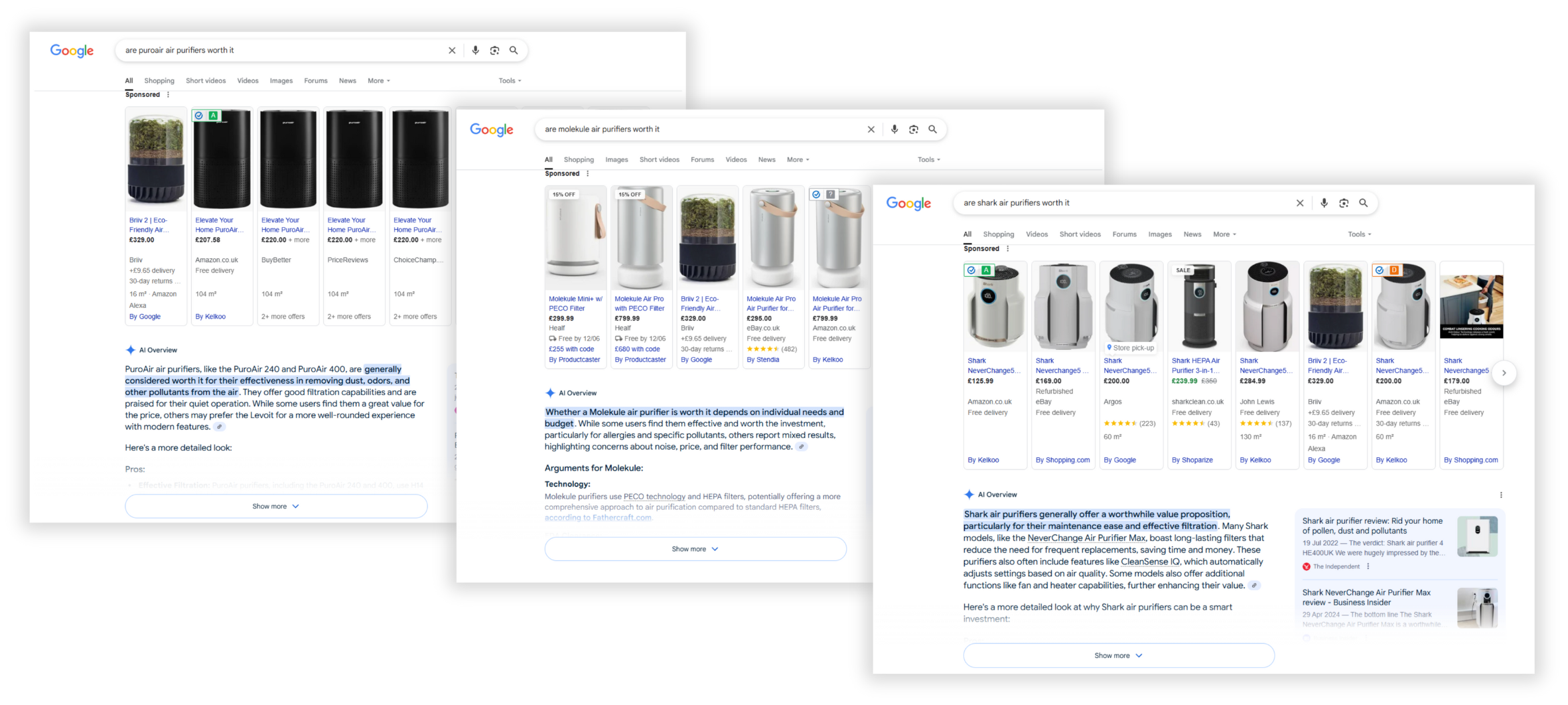
These search results are a reflection of Sundar Pichai’s vision for Google.
When Bloomberg asked Pichai about the concerns regarding the lack of separation between Google’s search and advertising divisions, Pichai stated that “commercial information is information, too.”
You wouldn’t trust a car salesman to tell you what’s wrong with the car they are trying to sell you, would you?
So next time you are researching a specific product, scroll down past the AI Overview, unless you only want to find out what the advertisers want you to know.
Or if you are set on using AI Overviews to research products, then be intentional about asking for negatives and always fact-check the output as it is likely to include hallucinations.
The endless loop of Google searches and advertisements in result pages
Google’s leadership has promised advertisers that AIO will offer users “ads that answer,” and they are delivering on that promise.
In 2024, Google shared its Ads Product Vision for AI Overviews and clearly explained the strategy behind everything we’re discussing today—you can watch the video here:
In the presentation, Google explained that they will be matching ads “not just to the query context, but also the information within the AI Overview.” The presenter goes on to show an example where products are recommended as part of the answers provided by the AIO.
Monetizing your searches with advertisers’ money is a crucial part of Google’s business.
So, if you’ve been using Google for a long time, then you will know that the search results have always included sponsored links.
Here you can see the search results page for ‘air purifiers’ back in December 2000:
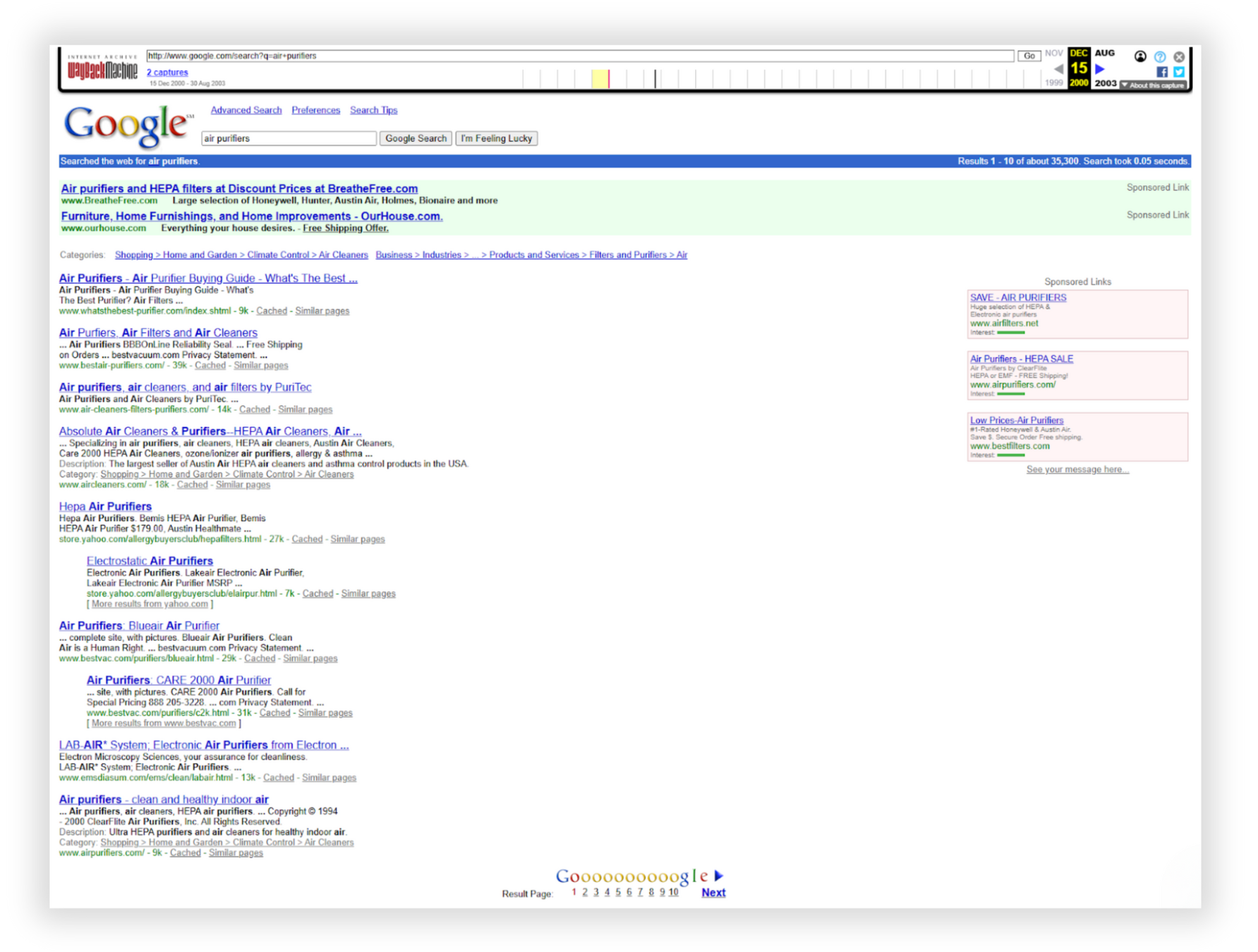
Over the years, Google found new ways to introduce sponsored results leading to what we see in July 2025:
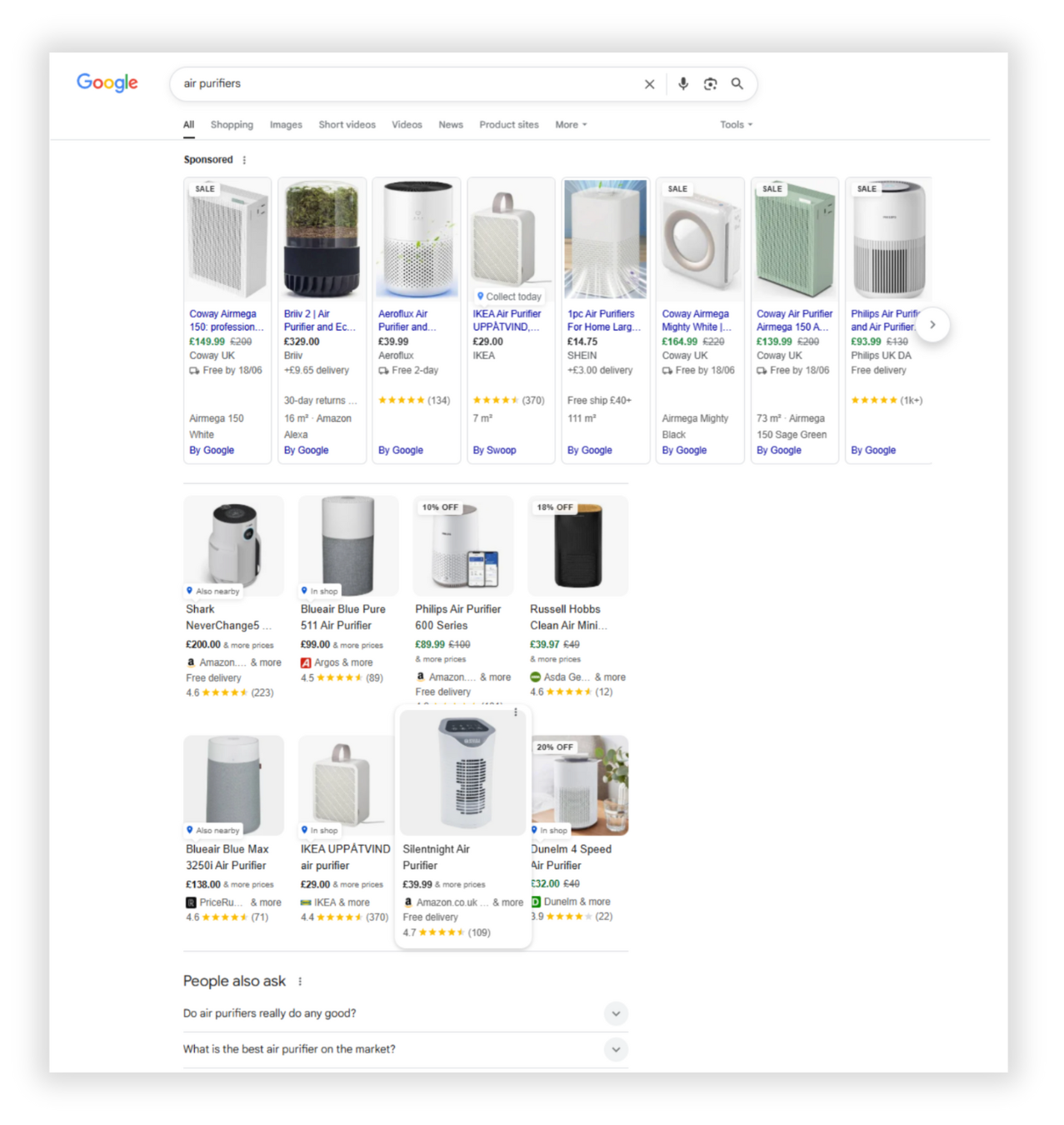
You may argue that someone searching for ‘air purifiers’ wants to see a product and that is why Google has shifted its focus to surfacing products in their quest to ‘satisfy the user.’
So let’s look at a different search term…
This is what Google used to show people searching for ‘dinosaurs’ back in 2013—9 links to websites, 1 link to YouTube, a pack of Google Images and 8 links to related searches:
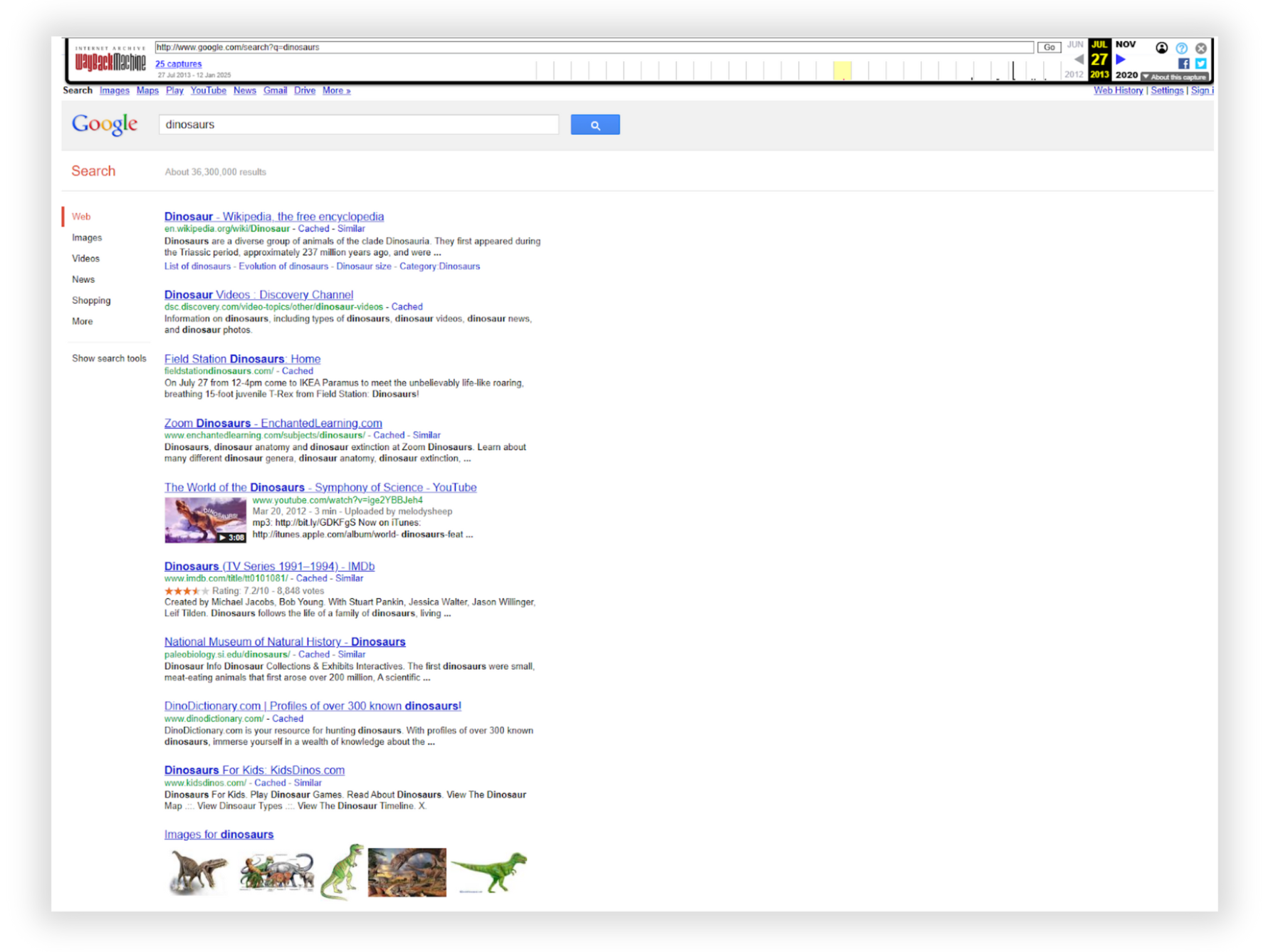
And this is how this page used to look like in 2020 — a prominent Wikipedia information box, 4 YouTube links, 8 links to websites, 3 news articles, 4 ‘people also ask’, and 21 links to related Google searches:
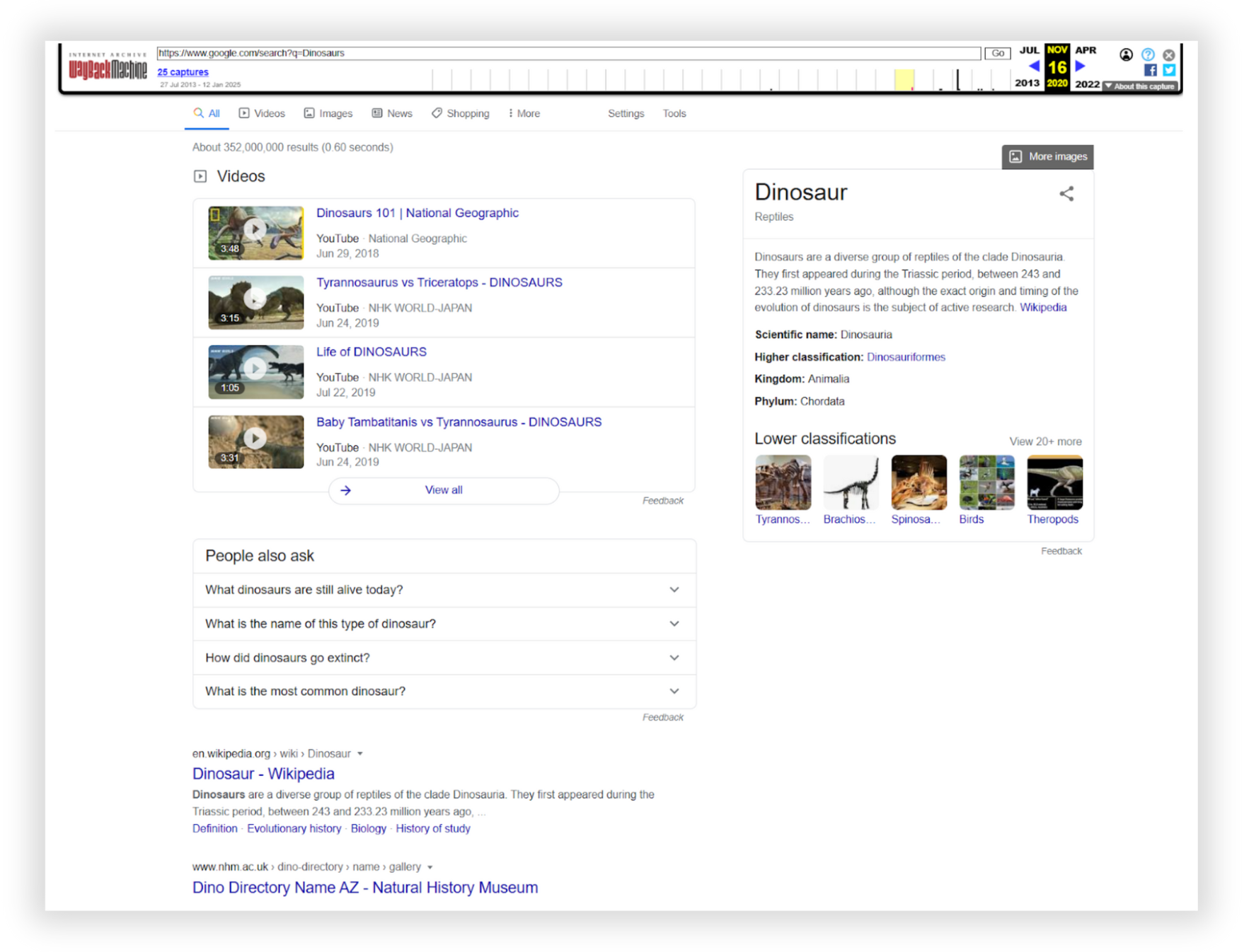
Now, let’s look at Google’s results for ‘dinosaurs’ in 2025.
First, searchers are met with a gallery of 50 dinosaurs, all of which link out to new Google searches:
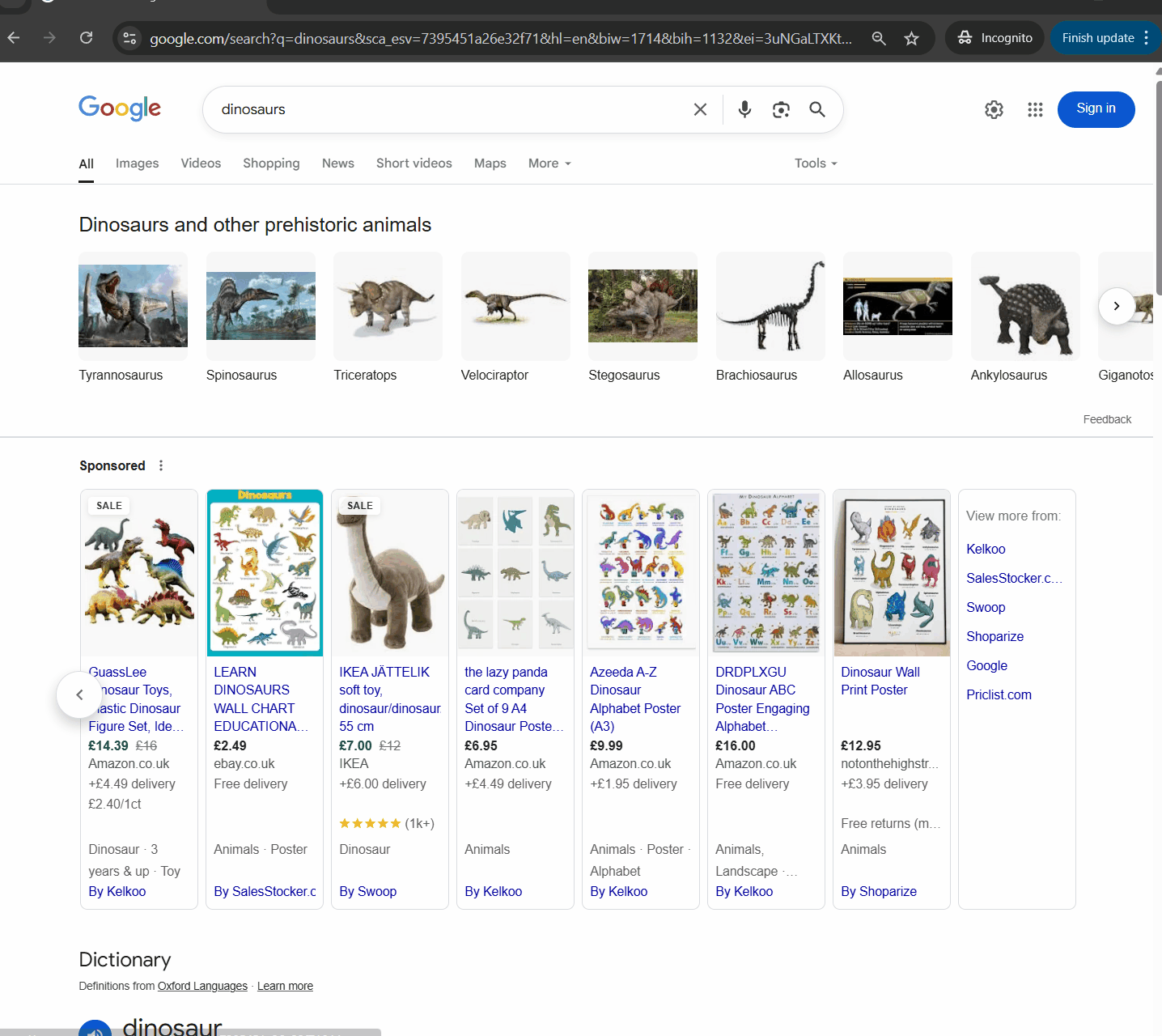
This is followed by a ‘Sponsored’ carousel featuring 21 shopping ads. It includes links to 6 shops at the end, one of which leads to a search inside Google Shopping:
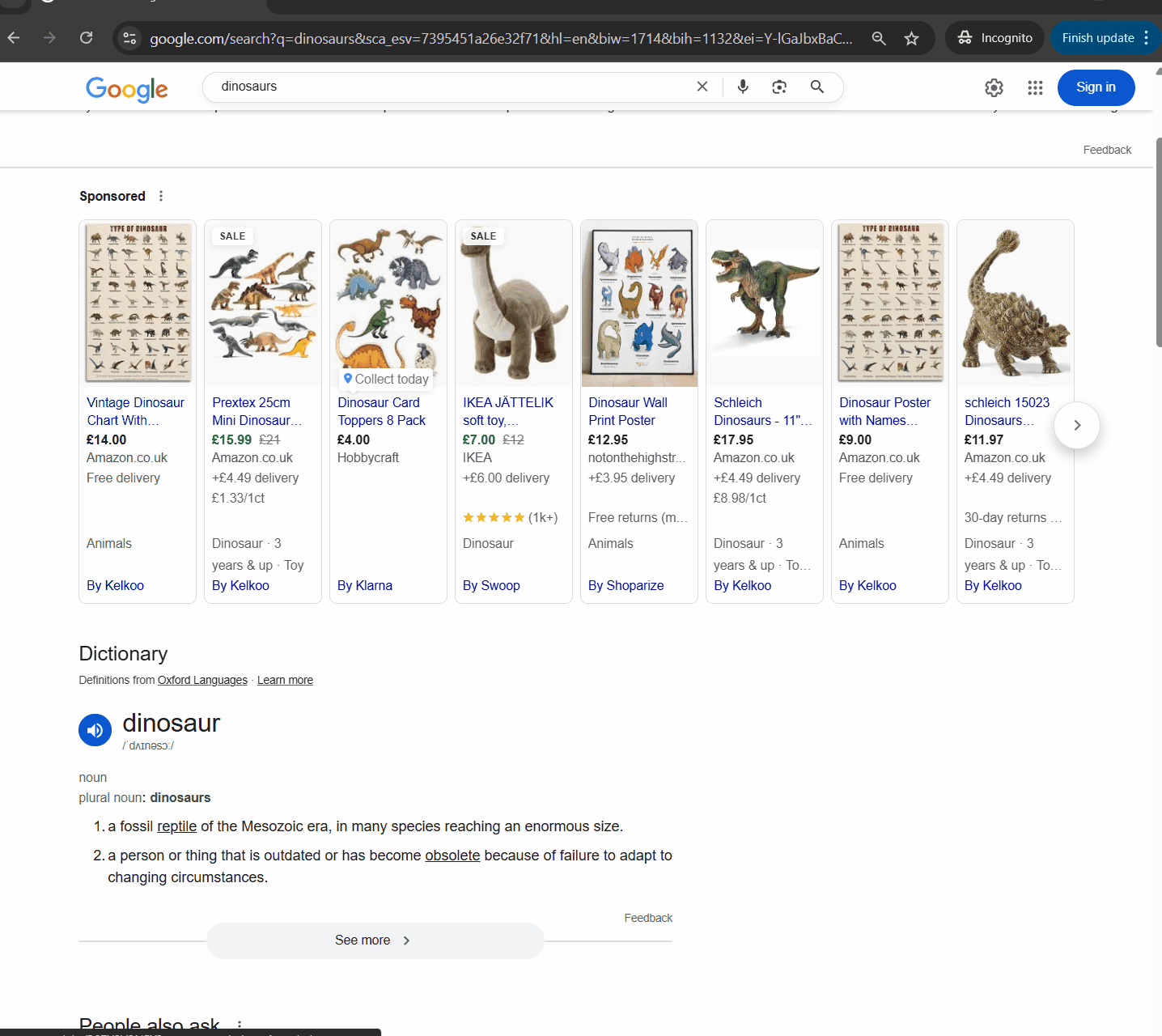
Next, Google gives you a dictionary definition of the word ‘dinosaur,’ followed by a ‘See more’ button that leads you to a new Google search for ‘dinosaurs meaning’:
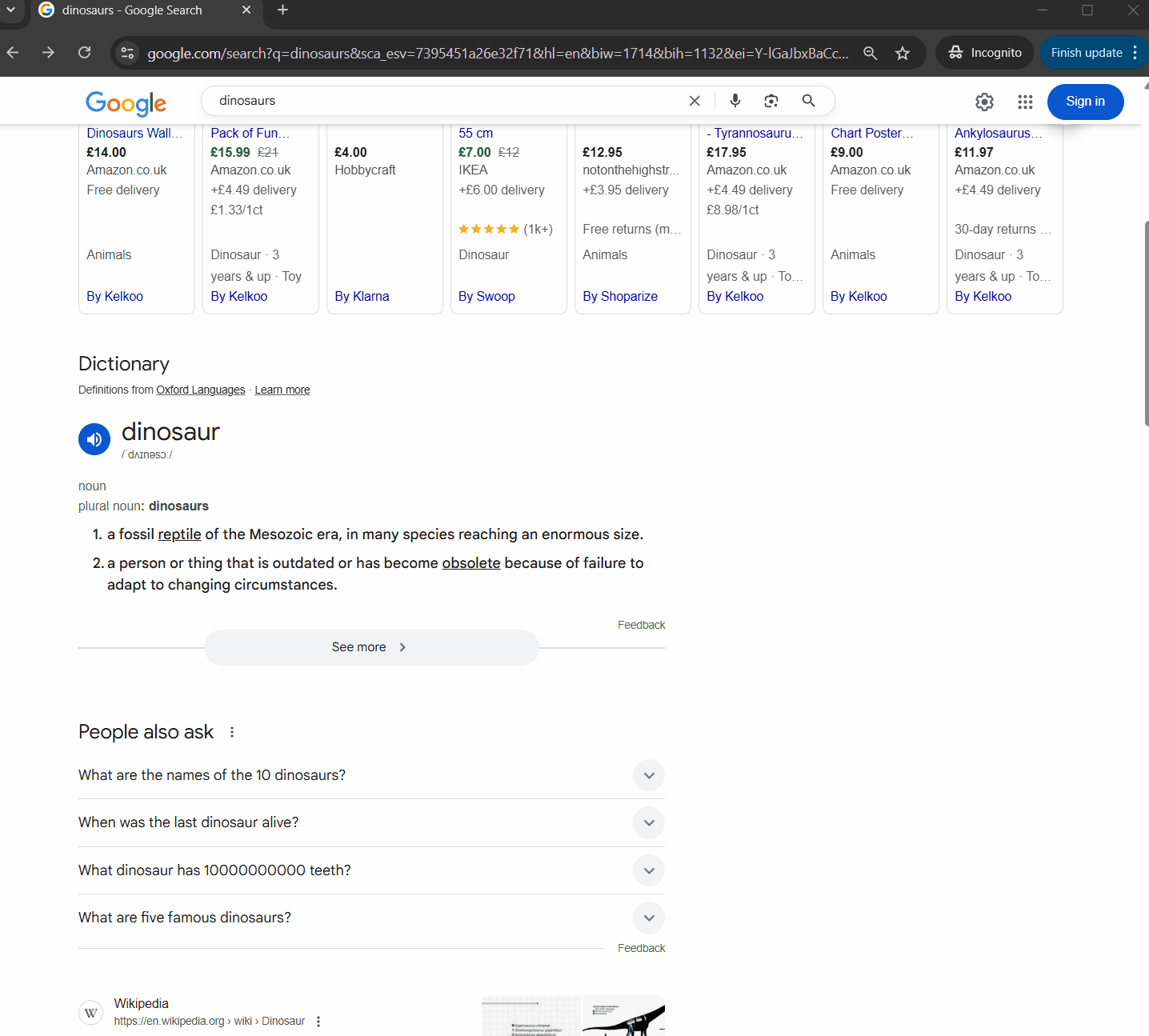
Further down, there is a ‘People also ask’ block with four questions, which will continue to expand and add more questions automatically as you click. By the way, the more you click, the higher the likelihood that you will find an AI Overview providing the answer:
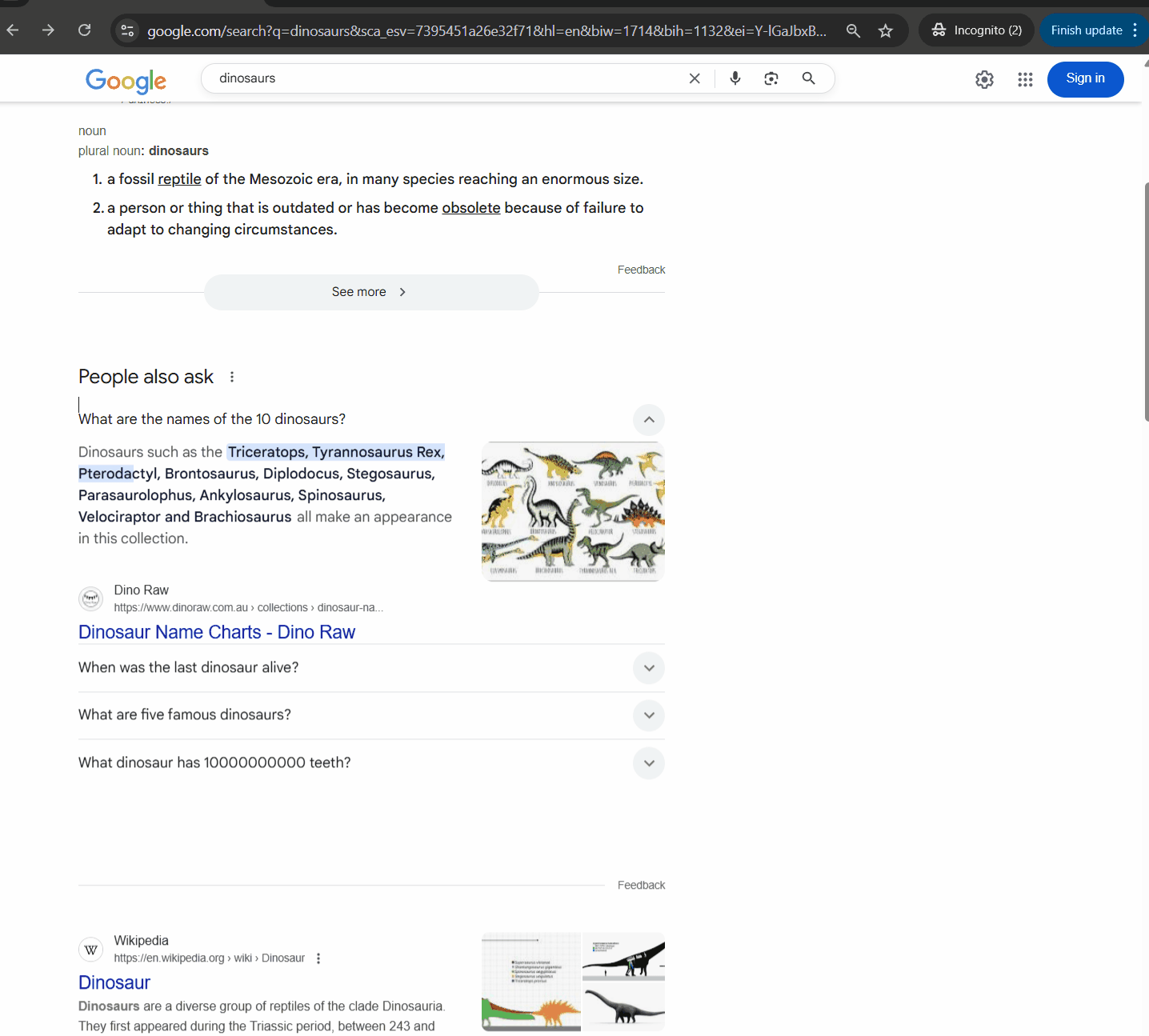
Scrolling past the 49 ‘People also ask’ questions that popped up after clicking, you finally get to a good old blue link to the Wikipedia page about dinosaurs, followed by a link to the Natural History Museum’s page about dinosaurs.
After that, you get a video pack with a ‘View all’ link that leads you to another Google search inside of the Videos tab:
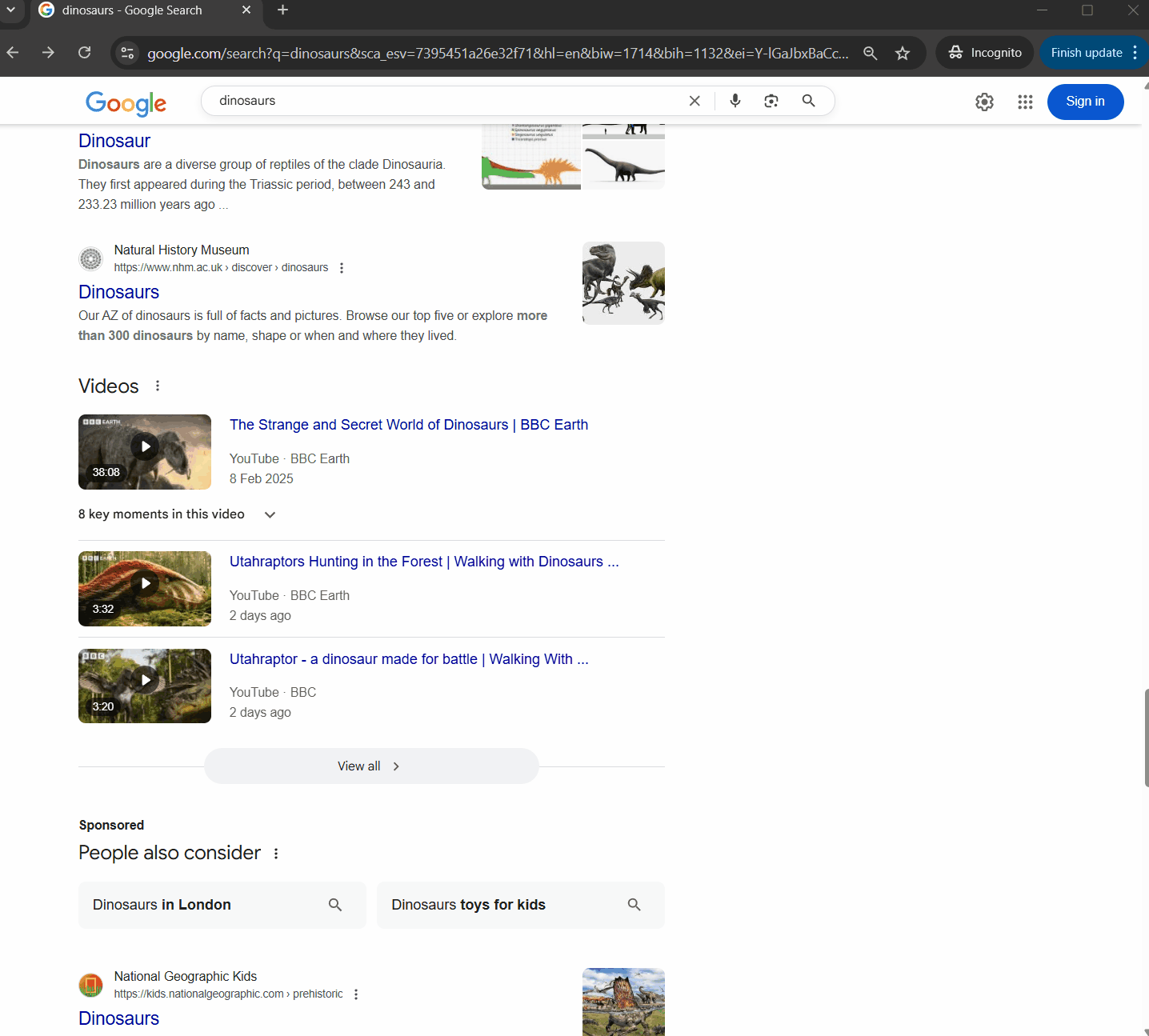
Before seeing any other organic result, Google adds a sponsored block called ‘People also consider’ that leads you to two new commercial searches: ‘dinosaurs in London’ and ‘dinosaurs toys for kids.’
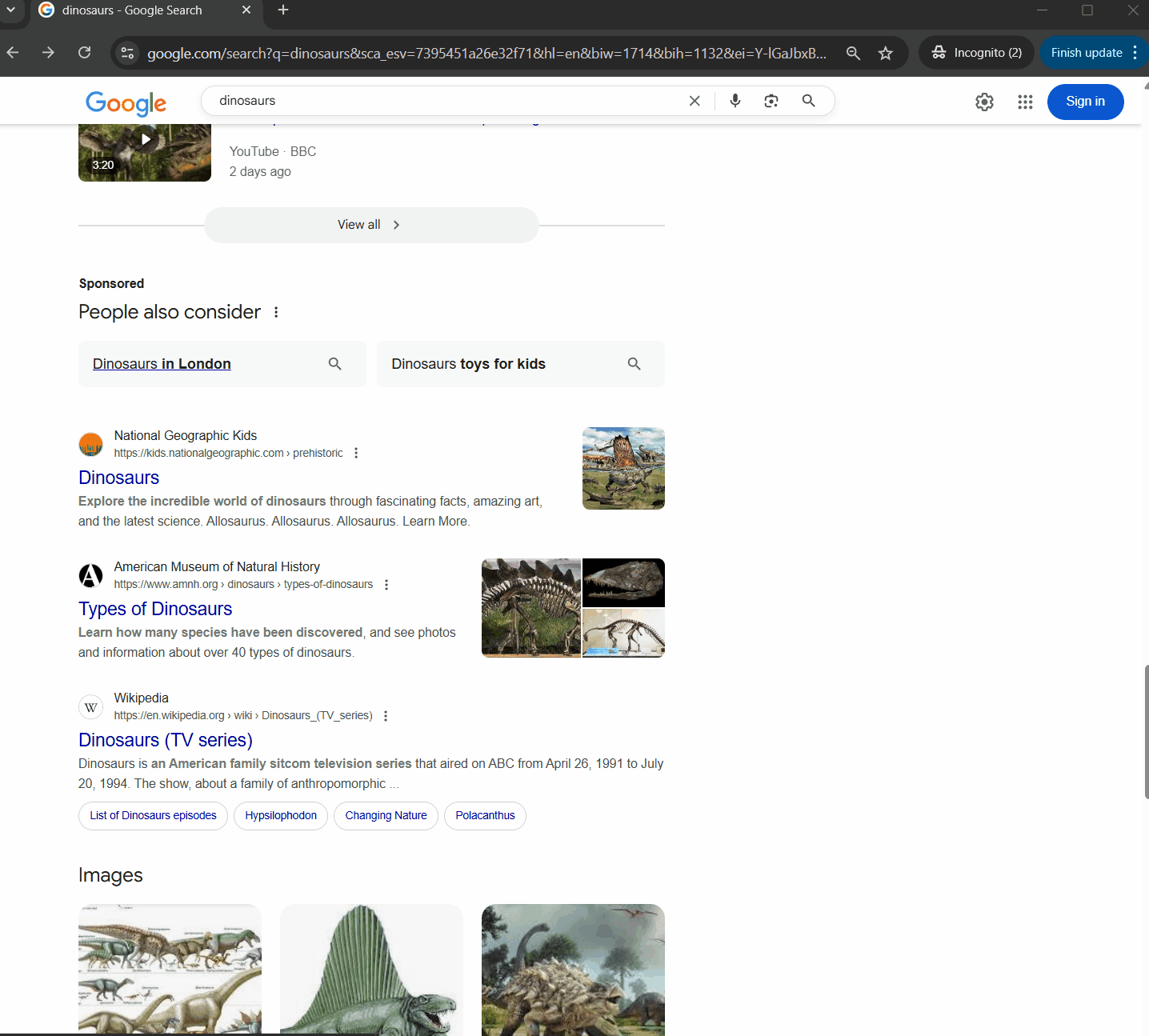
At this point, Google will have given you multiple chances to leave this page of results in pursuit of other Google searches.
If you were to still be around, you’d get to see six more blue links, a pack of images, and a block of ‘People also search for’ options that lead you to 14 new Google searches:
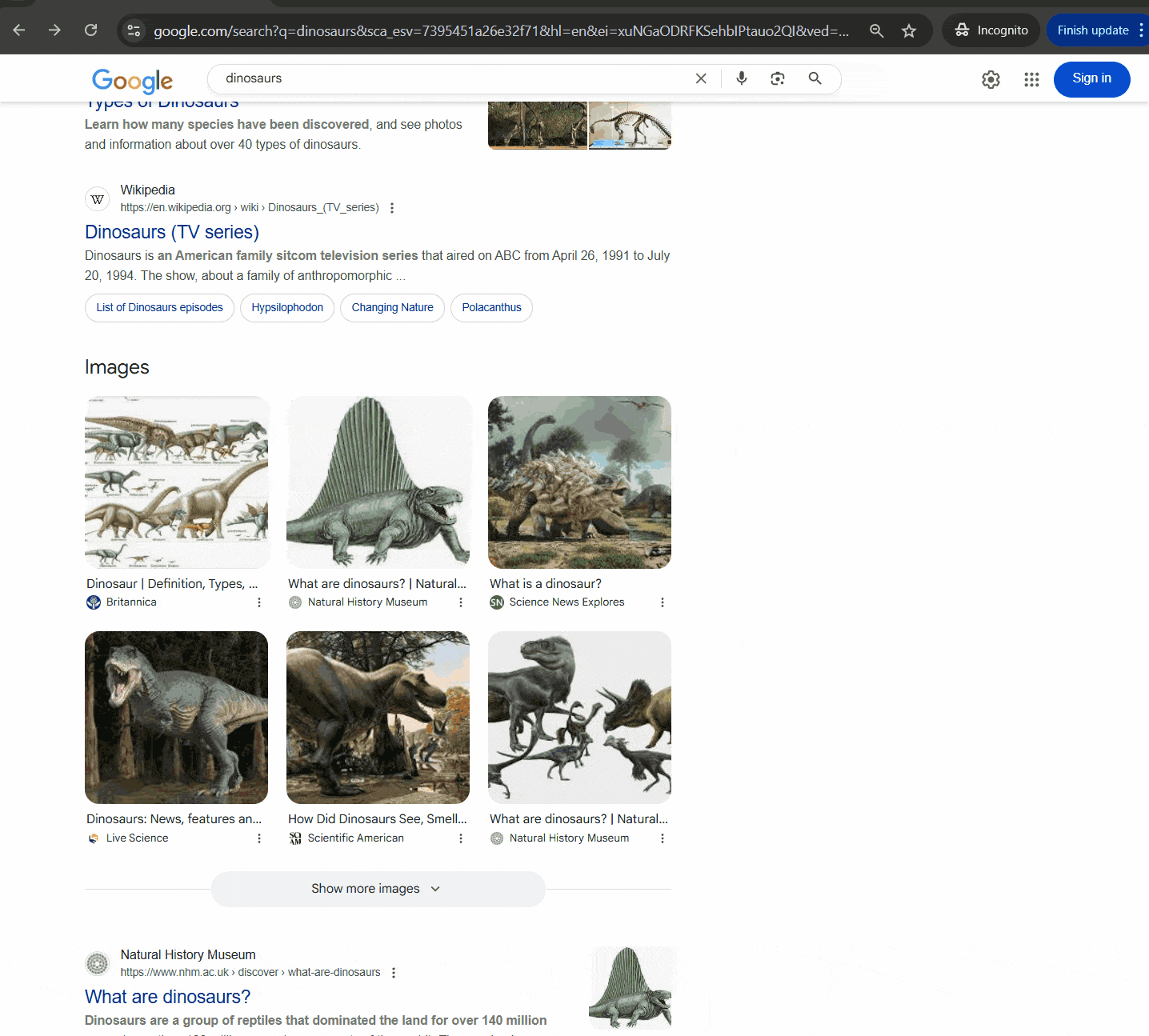
One could argue that Google is not only selling you anything you show interest in with its AI Overviews, but it is also peppering its organic search results with an increasing number of ‘features’ that keep you inside of Google and direct you to their advertisers.
On the first page alone, Google has created 69 opportunities for you to trigger completely new queries and 28 opportunities for you to click on an advertiser.
In contrast, you only get 11 chances to leave Google—and three of them are videos hosted on Google’s own YouTube.
Could this relentless push for users to trigger new searches be a driving factor behind Google’s reports of overall query growth during earning calls?
Especially considering that query growth, or more specifically, ‘commercial query growth’ is something investors care about…
In the 2025 Q1 Earnings Call, a representative from Morgan Stanley asked if there were any Search products that would continue to drive further commercial query growth throughout ’25-’26. Google replied, “On the commercial query side, look, AI Overviews continue to drive higher satisfaction and Search usage. […] That’s really the core already of the answer, that AI Overviews sits at the center of your question here.”
This figure must be very important to investors because Google didn’t hesitate to issue the following statement when Apple’s SVP of Services noted in his antitrust trial testimony that Google searches in Safari fell for the first time ever in 2024:
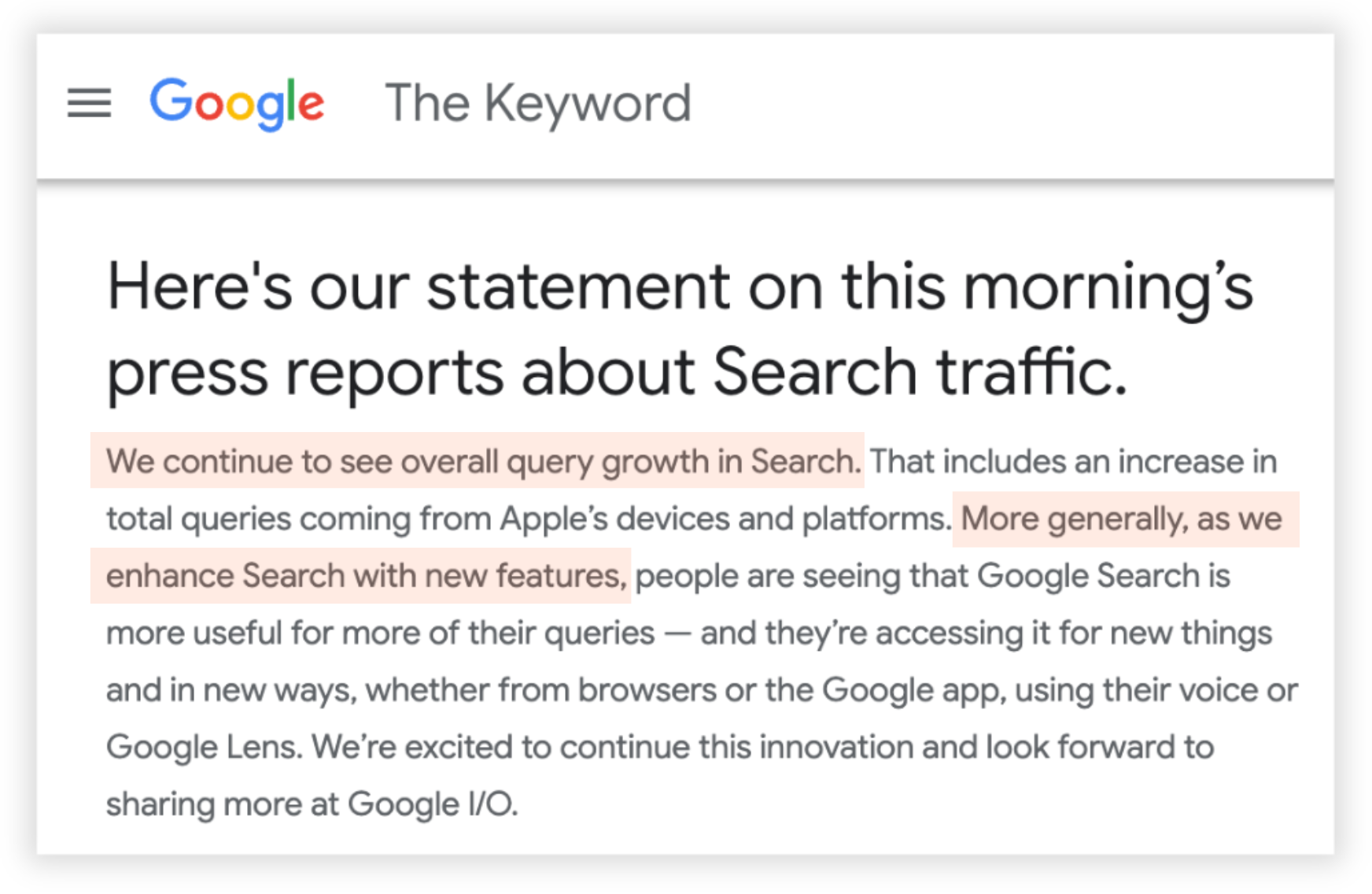
It must be tough for Google to fulfill their role as a search engine that helps people find their way around the web when Alphabet leadership is so focused on keeping users from leaving the search box 🎻
Google partnered with Reddit and spammers took notice
Now Reddit is on its way to becoming the web’s poisoned chalice—don’t be fooled by their product recommendations.
On the very same day Reddit filed to list on the New York Stock Exchange, Google and Reddit announced an expansion to their partnership.
The $60 million deal was announced on 22 February 2024 and saw Reddit providing Google with programmatic access to their content through their Data API, allowing Google to use this data to train their AI and more efficiently display Reddit threads in search results.
Since then, Reddit has reportedly blown up, with huge traffic figures from search that resulted in logged-out daily active-unique-visitor numbers rising by 70%—these are people who aren’t necessarily Reddit users but passers-by led by Google.
That is why, no matter what you google, you are likely to always find an entire section of search results dedicated to Reddit threads:
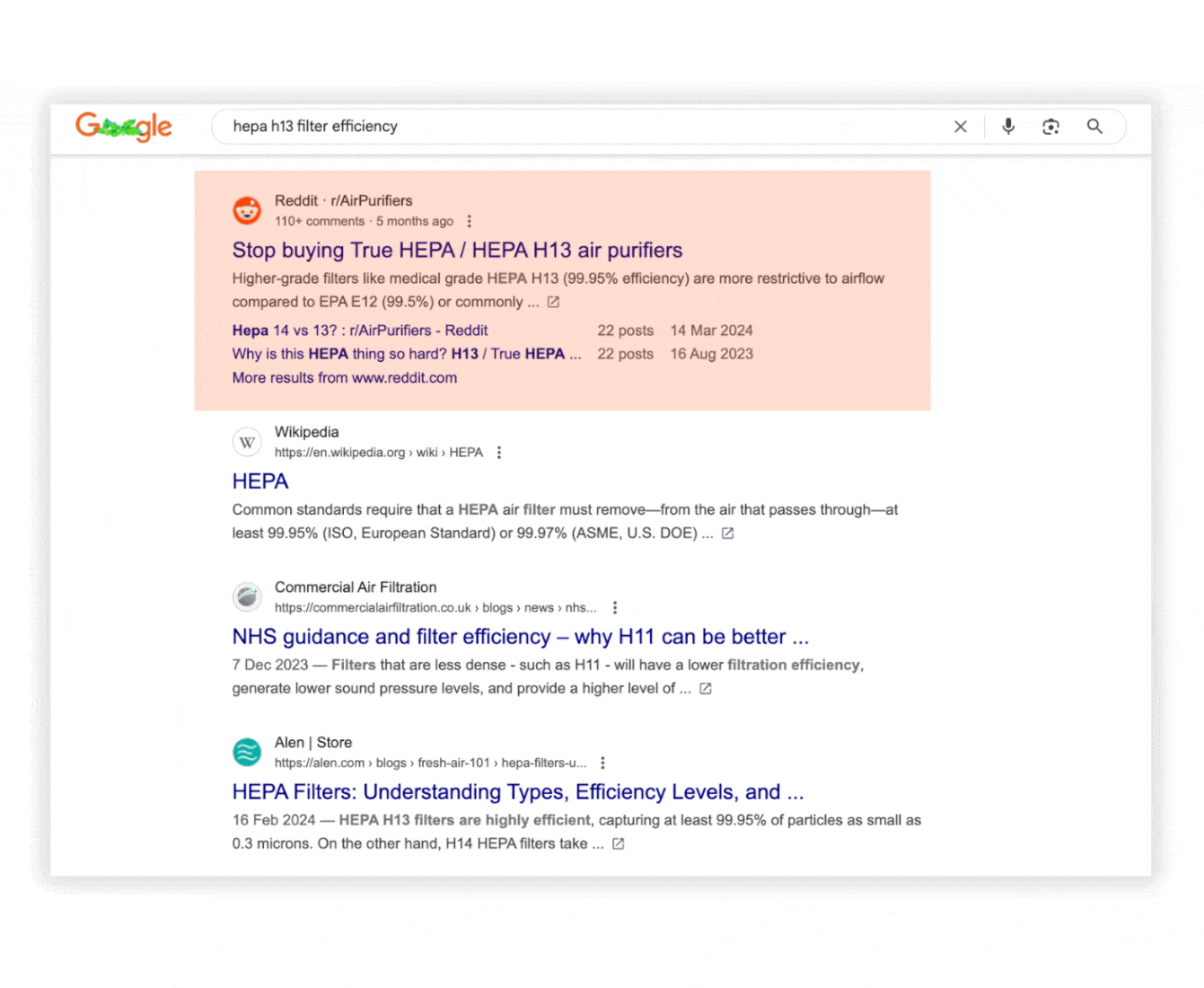
And this is particularly true for product reviews. According to research conducted by Detailed, Reddit appears in 97.5% of product review queries.
This explosion of Reddit ranking highly on Google could explain why there are so many posts asking for advice on products that go on to include models the OP is “considering” hyperlinked to Amazon listings with affiliate tags, or that have been edited to add “models Redditors recommend” hours after posting the question:
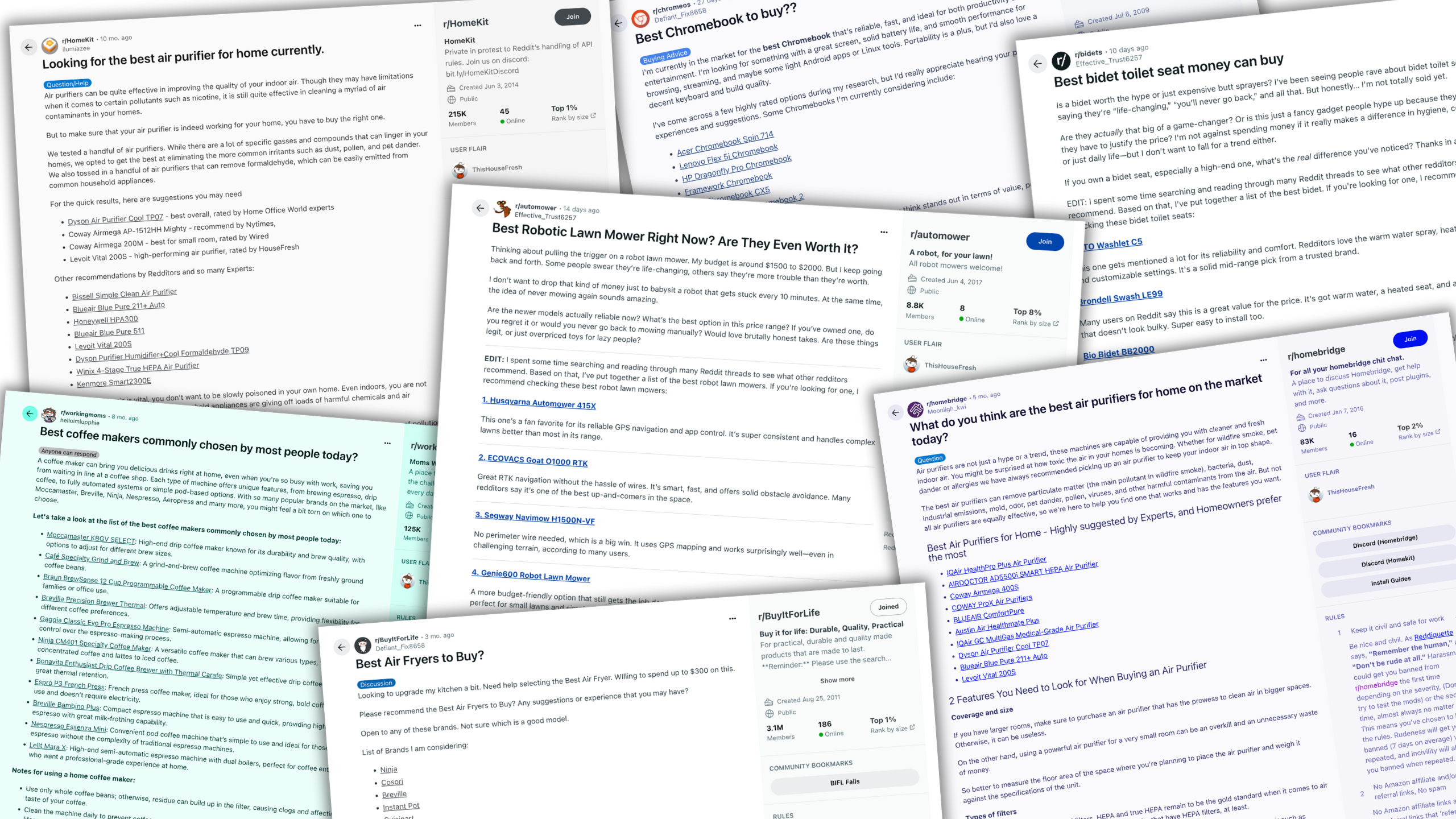
And it may also explain why there are so many Redditors with a post history full of “questions” about products:
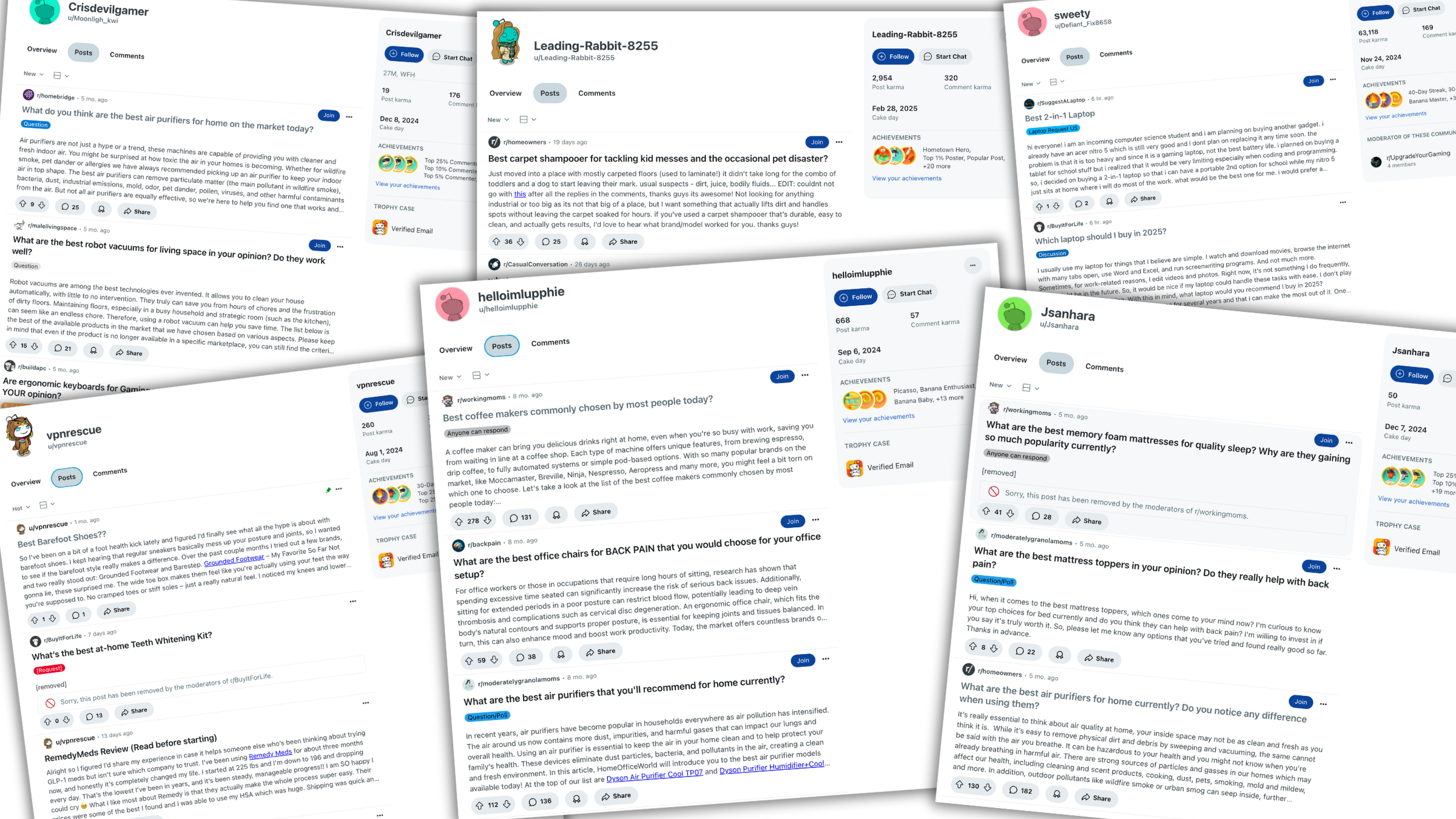
Things got so out of hand that there are now entire subreddits dedicated to product reviews, where every thread is 100% positive about the product, the entire post is written by AI and there is zero engagement from real Redditors:
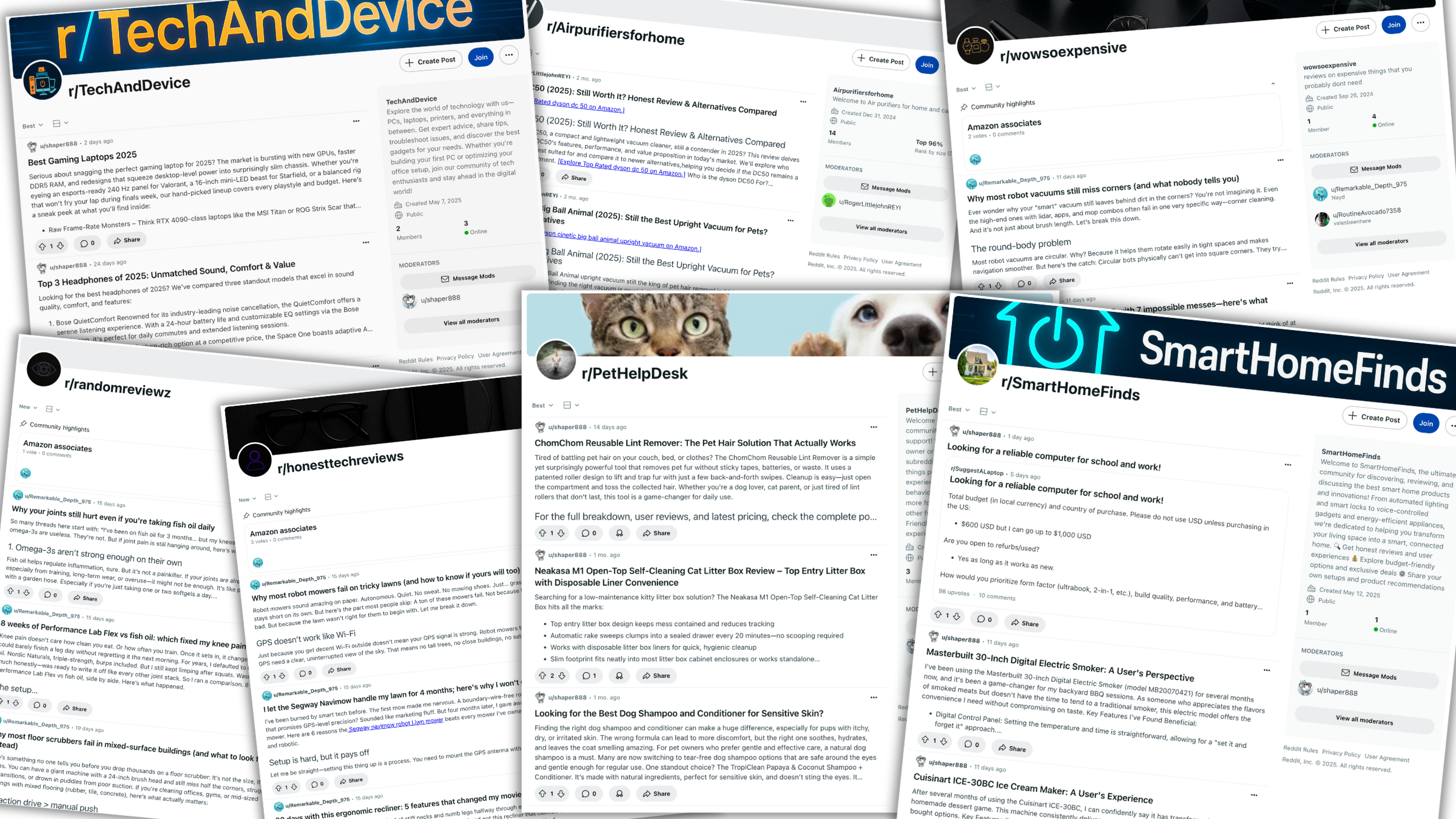
And even though these subreddits offer no value to users, they are still achieving top rankings on Google just because they were published on Reddit.com:
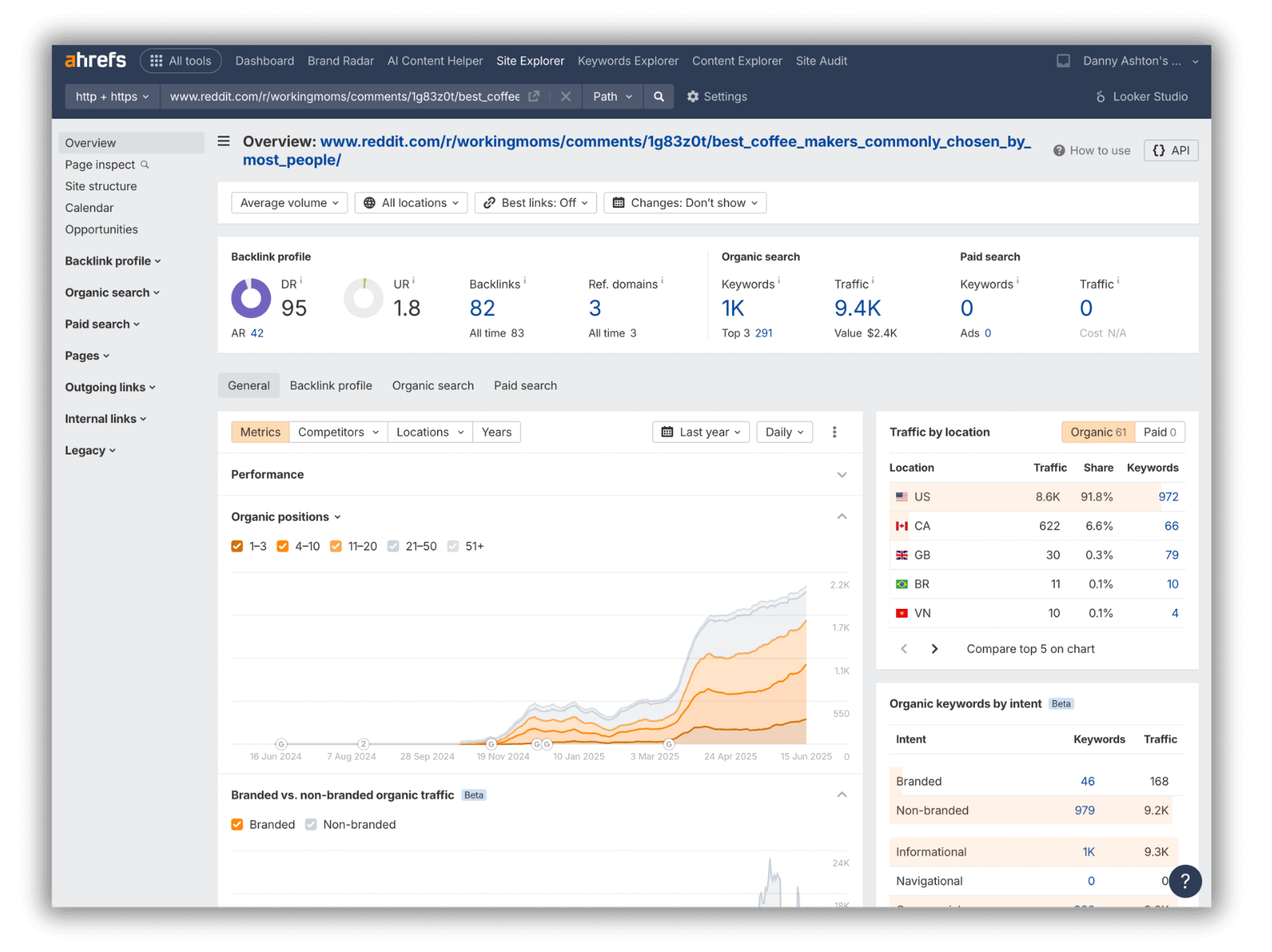
As if AI slop wasn’t enough of an issue for Reddit moderators, Google has now created a shortcut for anyone wanting to rank on the first page of search results for virtually any keyword.
And now, Reddit moderators are for sale.
It has gotten so bad that huge subreddits such as r/DebtFree (1.7M members), r/Banking (124K members), r/software (285K members), r/Mattress (114K members) r/Supplements (441K members) have been allegedly infiltrated by affiliate spammers.
A group of redditors has been actively working to uncover this network of bribes, sock-puppet comments, rent-a-mod arrangements and dormant subreddit buying. The latest update to their investigation (now deleted) surfaced two companies that have been found to be involved, and one of them is a company we wrote about in our second Google exposé.
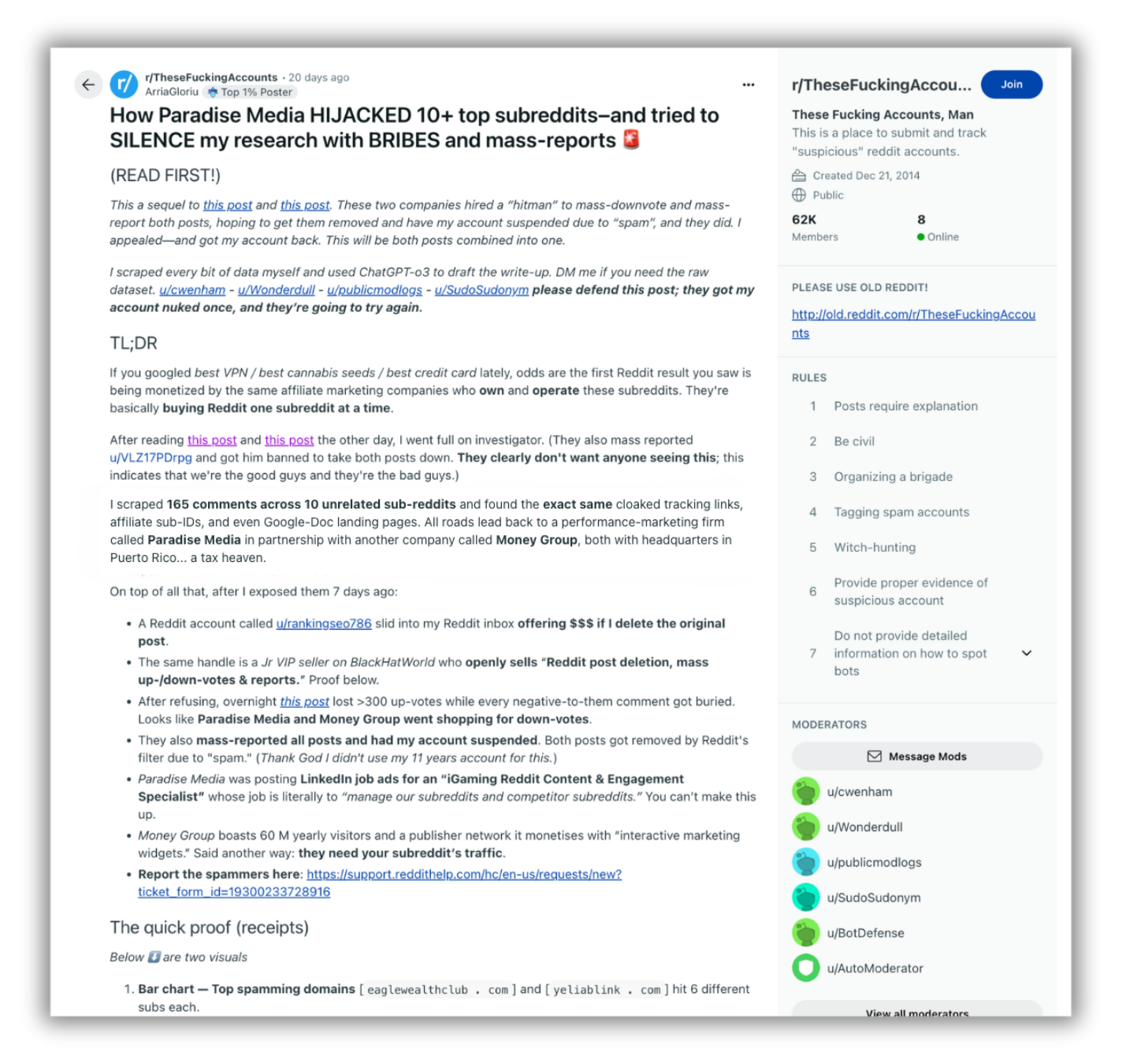
These companies have been caught, and I quote, “buying high-traffic subreddits by buying the moderator accounts or paying for a ‘moderator seat’ to manipulate high-traffic threads and shove affiliate spam down your throat.”
If this is true, then Google has buried real, human-powered websites while boosting Reddit threads created by the very same people who engage in site reputation abuse spam.
Google created a regurgitation machine that is destroying livelihoods
Analyzing the changes in organic traffic to publisher websites between 2023 and 2025.
On 20 May 2025, Google’s CEO, Sundar Pichai, announced AI Mode, a “total reimagining of Search” in the form of “an end-to-end AI Search experience.” Following Pichai’s announcement, Google’s head of Search, Liz Reid, explained that “this is the future of Google Search.”
Google is replacing traditional search results with a ChatGPT-inspired chatbot that regurgitates content from across the web to compile a fully-fledged answer to your question.
Here is a demo published by Google on their blog as AI Mode hasn’t been rolled out in our location yet:
Search marketing experts and web content creators agree that AI Mode is likely to further the damage already caused by Google’s algorithm updates in 2022-2024 and by Google’s AI Overviews in 2024-2025.
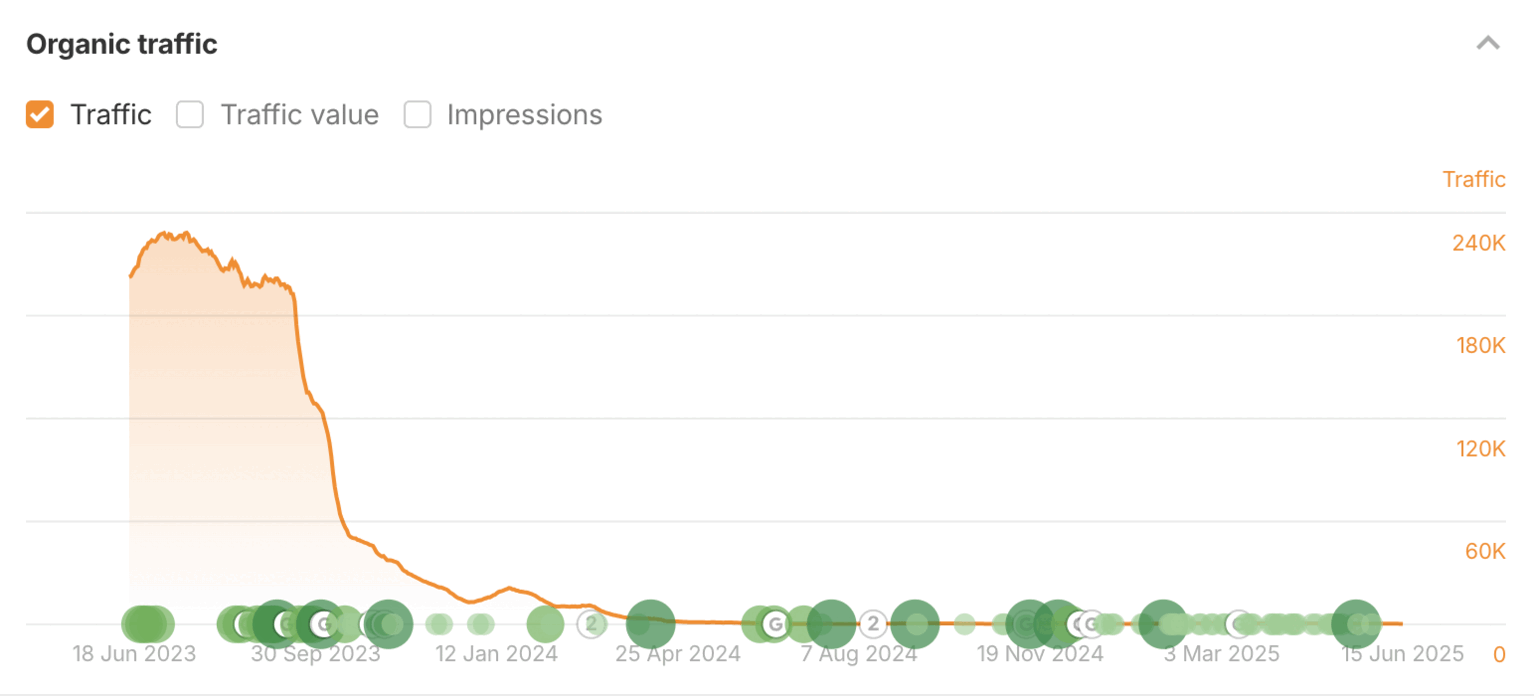
Google disagrees.
Over the last two years, high-profile Googlers like Sundar Pichai and Elizabeth Reid have consistently stated that AIO and AI Mode are just additional opportunities for sending traffic to the web:
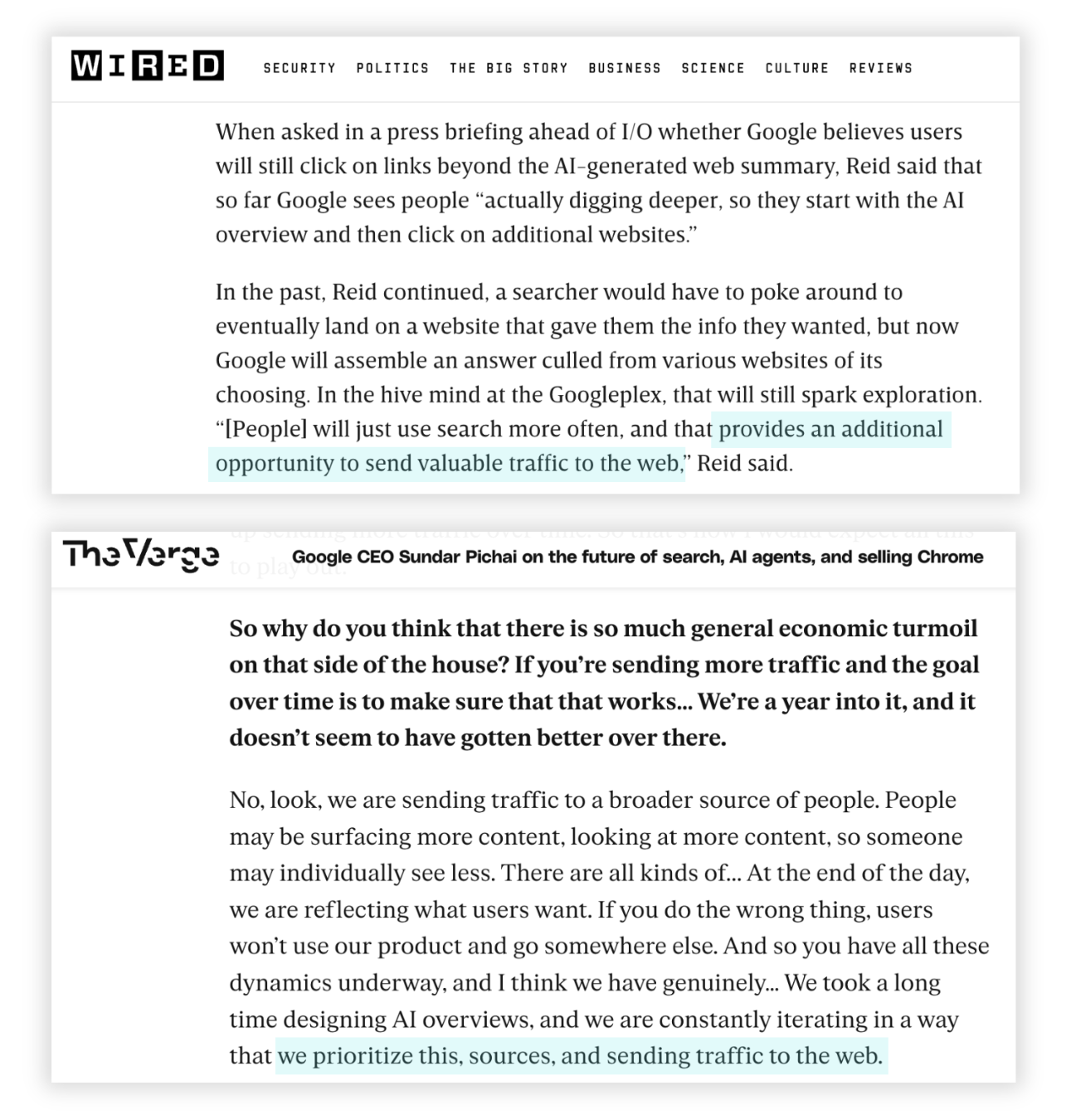
And this makes sense, considering Google has built its entire business on the promise to send traffic to the web.
On their corporate philosophy page they seem to brag (?) about how their aim is to have people leave their website:

And on this page they clearly explain how they support a healthy web ecosystem by sending visitors to websites:
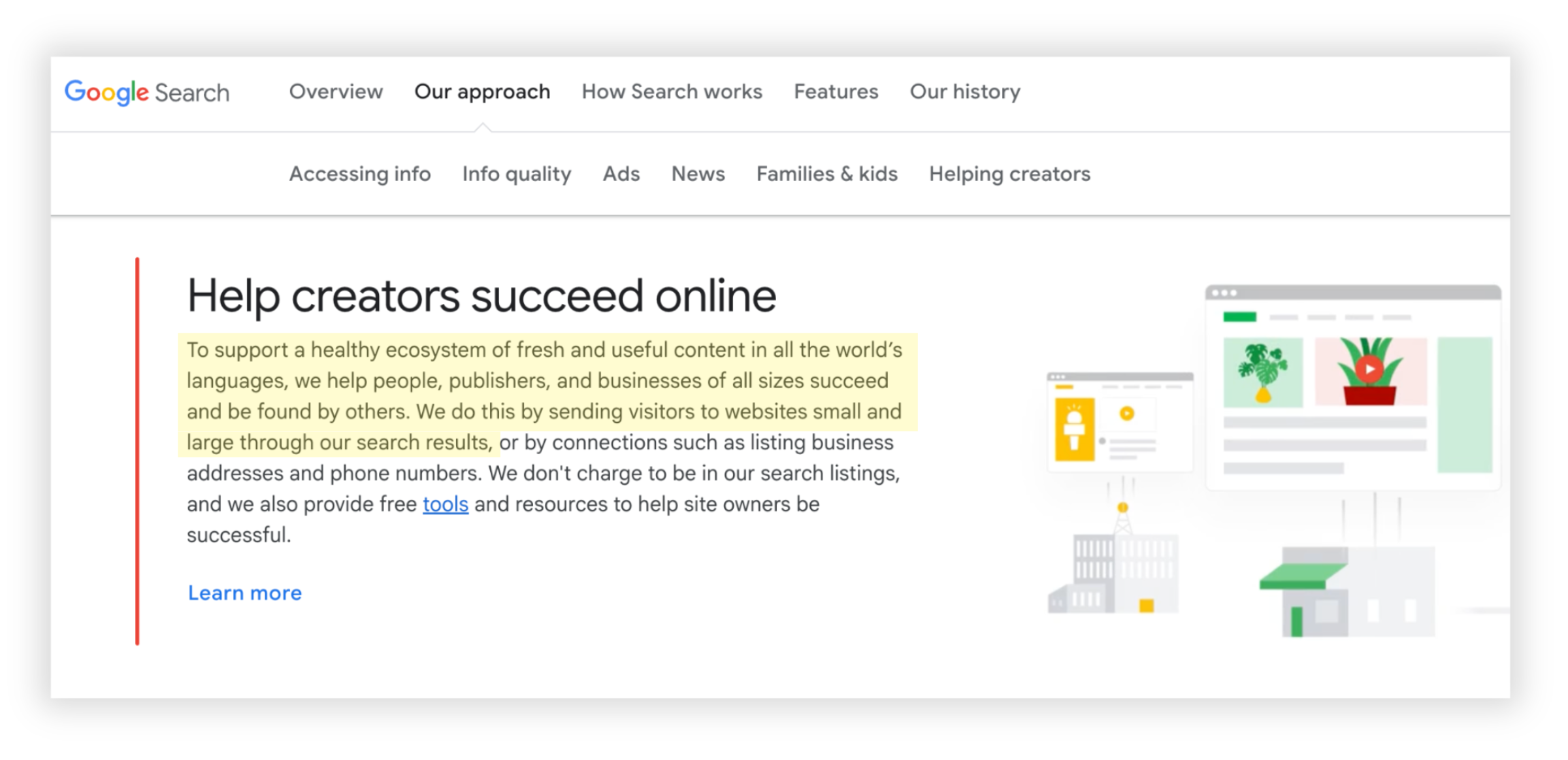
In fact, Google is so committed to helping web creators succeed online that they have an entire section of their website dedicated to celebrating publisher success stories.
This gave us an idea.
We used a marketing tool called Ahrefs Site Explorer to estimate search traffic figures between 15 June 2023 and 15 June 2025 for all English-speaking independent publishers highlighted in Google’s Success Stories between 2022 and 2024.
Our data shows that 81% of publisher sites celebrated by Google have experienced traffic losses since 2023.
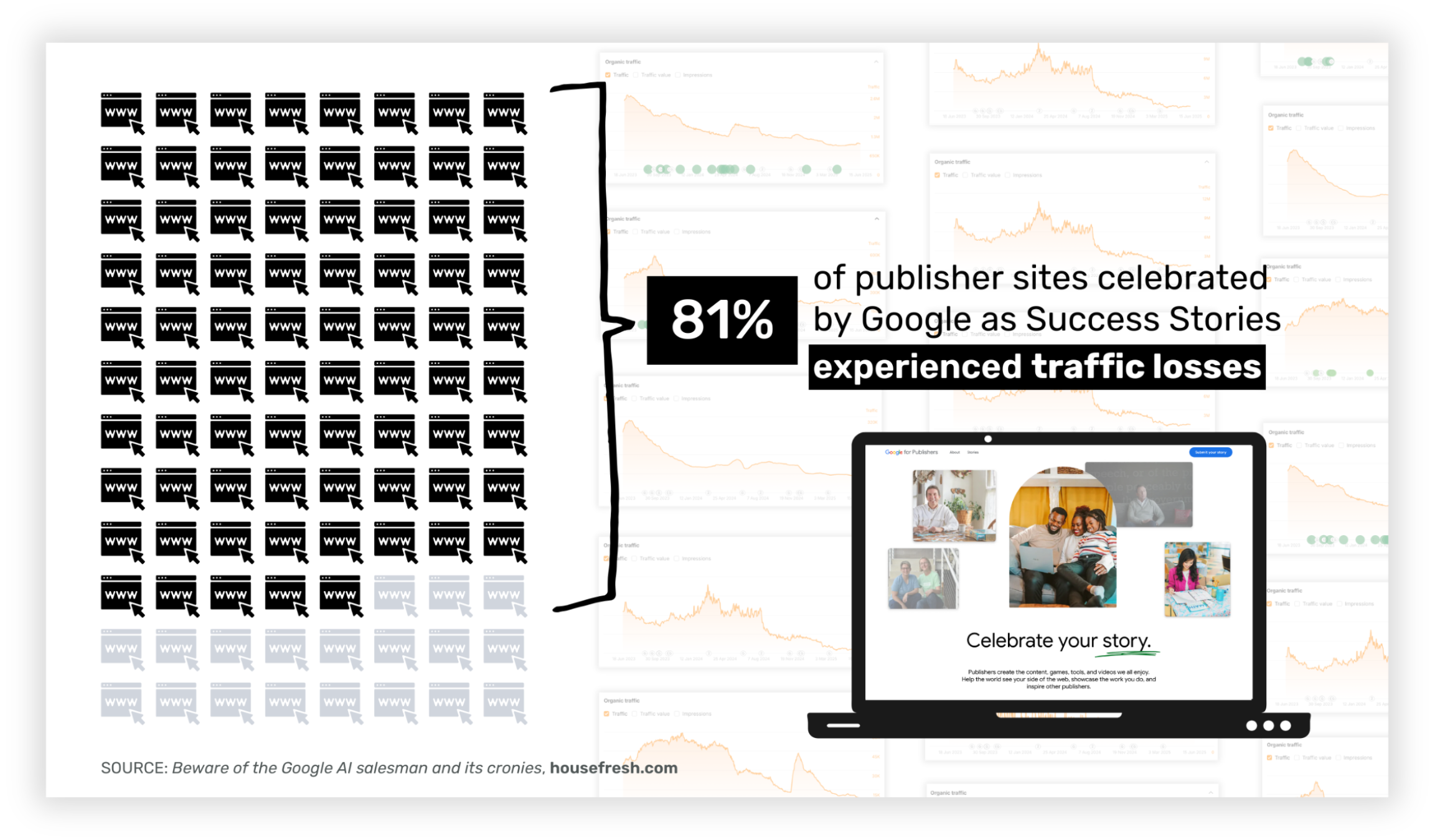
These are websites belonging to businesses that Google not only highlights as ‘Publisher Success Stories’ but also includes in their Economic Impact Reports.
The shocking story of Charleston Crafted clearly shows how misguided it is for Google to be parading websites in times like these.
The very next day after a Google photographer visited their home for a photoshoot, Morgan and Sean saw their Google Search traffic starting to tank. Within a few weeks, Charleston Crafted experienced a traffic drop of 74%—this can have life-shattering consequences for a web creator.
Of course, that didn’t stop Google from featuring their website prominently as a shining example of how “Google helps South Carolina businesses move toward their goals.”
However, one could argue that websites celebrated by Google as Publisher Success Stories are not representative of the wider web.
That is why we added the websites belonging to those invited to the Googleplex for the Web Creator Conversation Event in 2024, those who have been public about attending Google Publisher Meetups in the past three years, and those who have been public about their struggles with Google in recent months.
84% of independent web creators analyzed have experienced traffic losses, with 43% of sites receiving 80% less traffic from Google Search between 2023 and 2025.
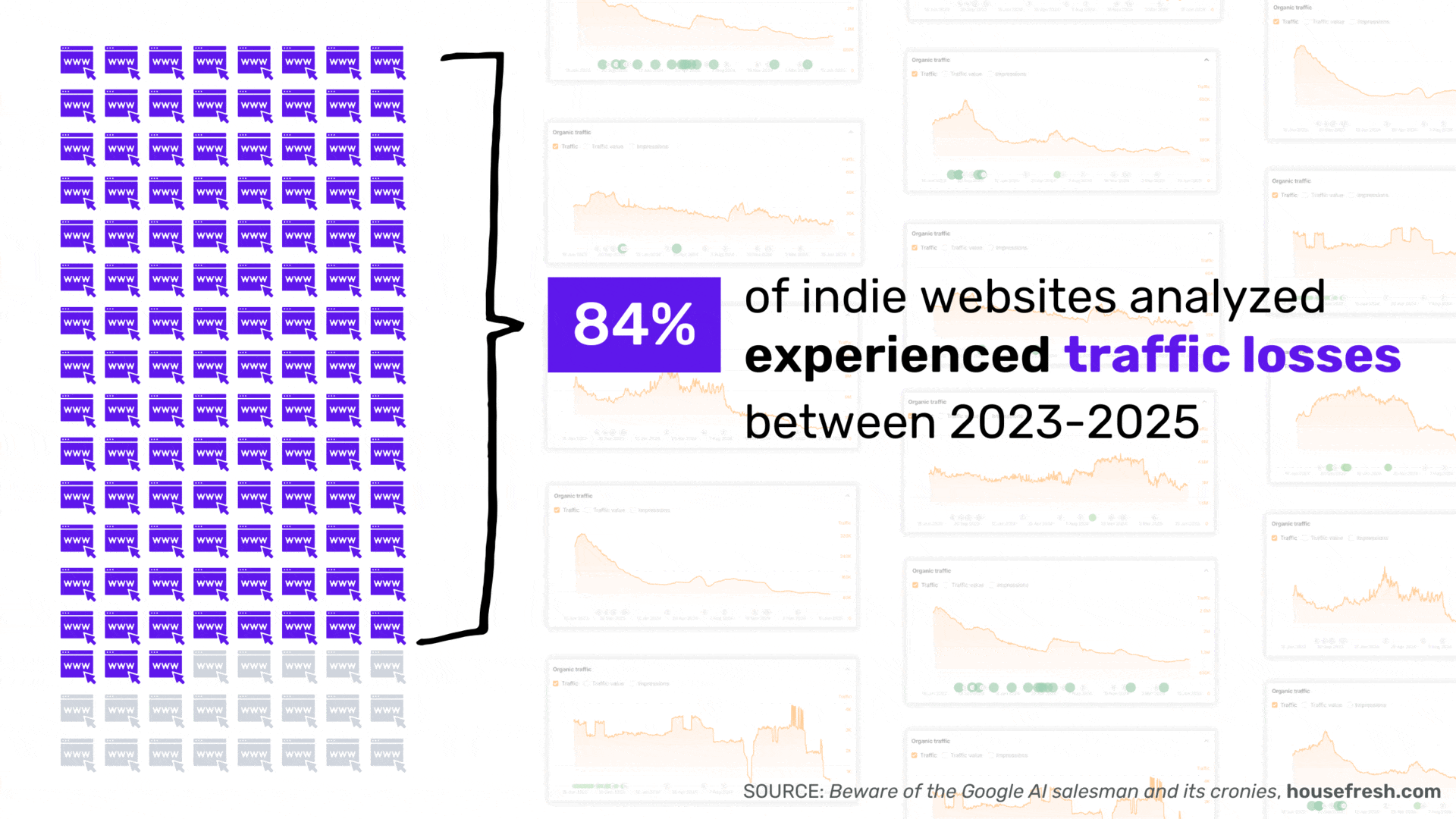
But why stop there?
To build a more robust and balanced dataset, we filled in the gaps with the help of Detailed’s rankings of “the world’s most successful and profitable blogs.” We pulled the top 10 URLs from each of the categories, including web publishers that are much larger and, in many cases, part of big media companies. Blogs belonging to retailers, sites that have been acquired+redirected and blog sections of corporate websites were removed.
The final list included 507 web publishers across 43 categories, ranging from small travel blogs like Between England & Everywhere to huge reputable magazines like Allure.
Our data shows that nearly four in five web publishers have experienced traffic losses since June 2023, with almost half of all websites analyzed seeing traffic from Google Search dropping by at least 60%.
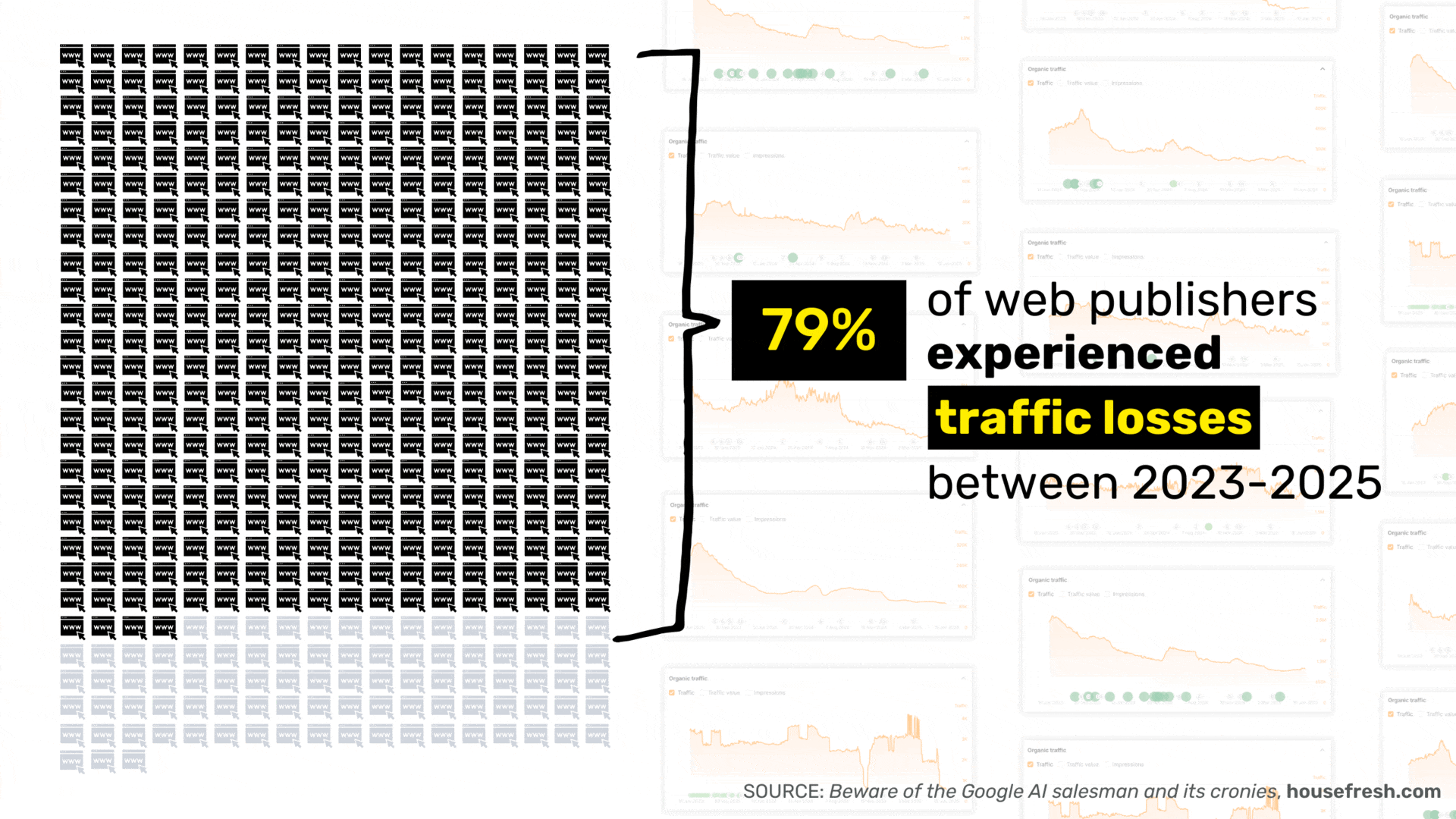
While 79% of web publishers experienced traffic losses between 2023 and 2025, Reddit saw their traffic from Google Search grow by 990%.
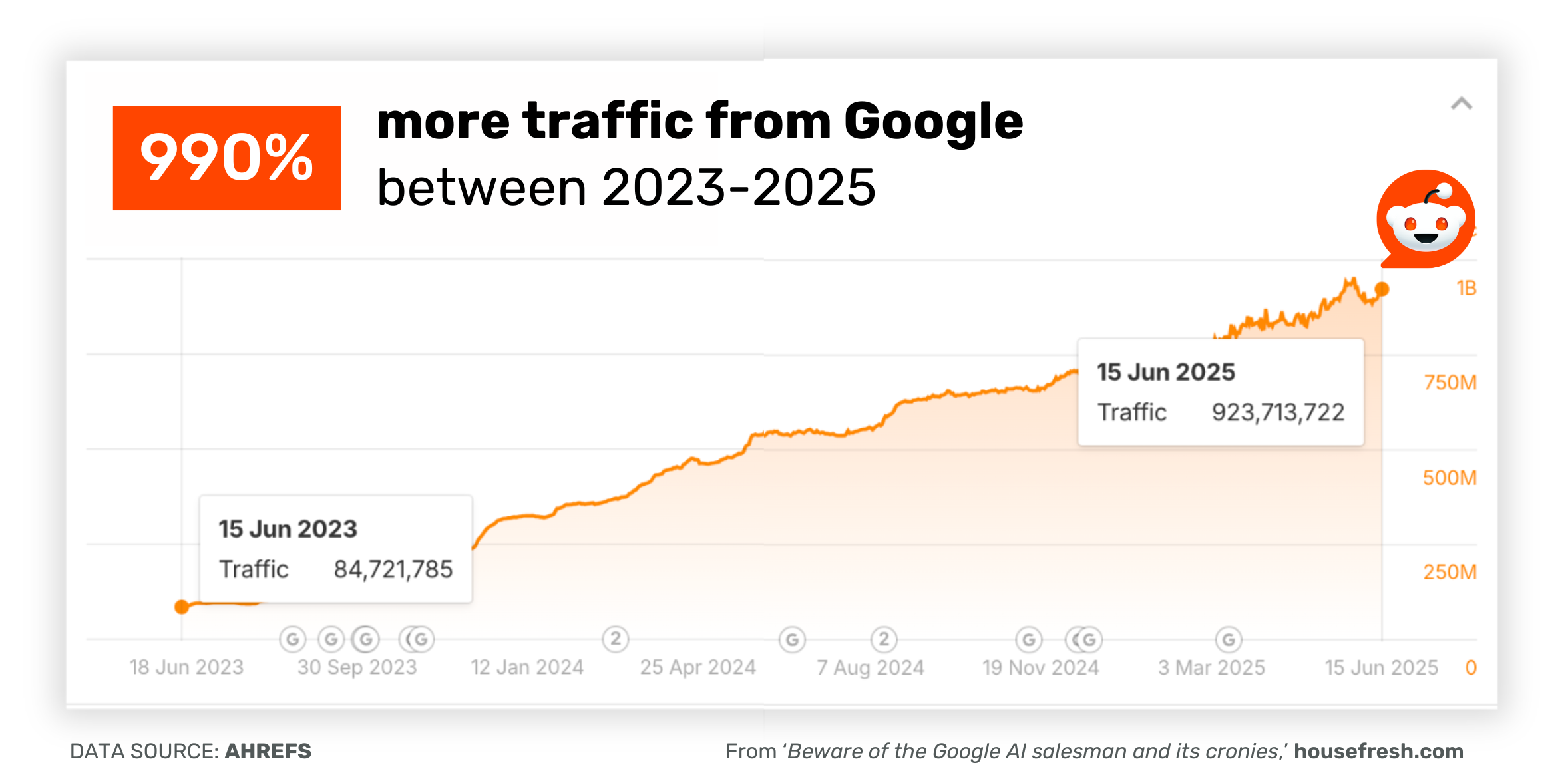
As if this loss of traffic wasn’t enough, websites around the world report experiencing “the great decoupling,” a phenomenon through which impressions in Google Search are trending up while clicks are trending down.
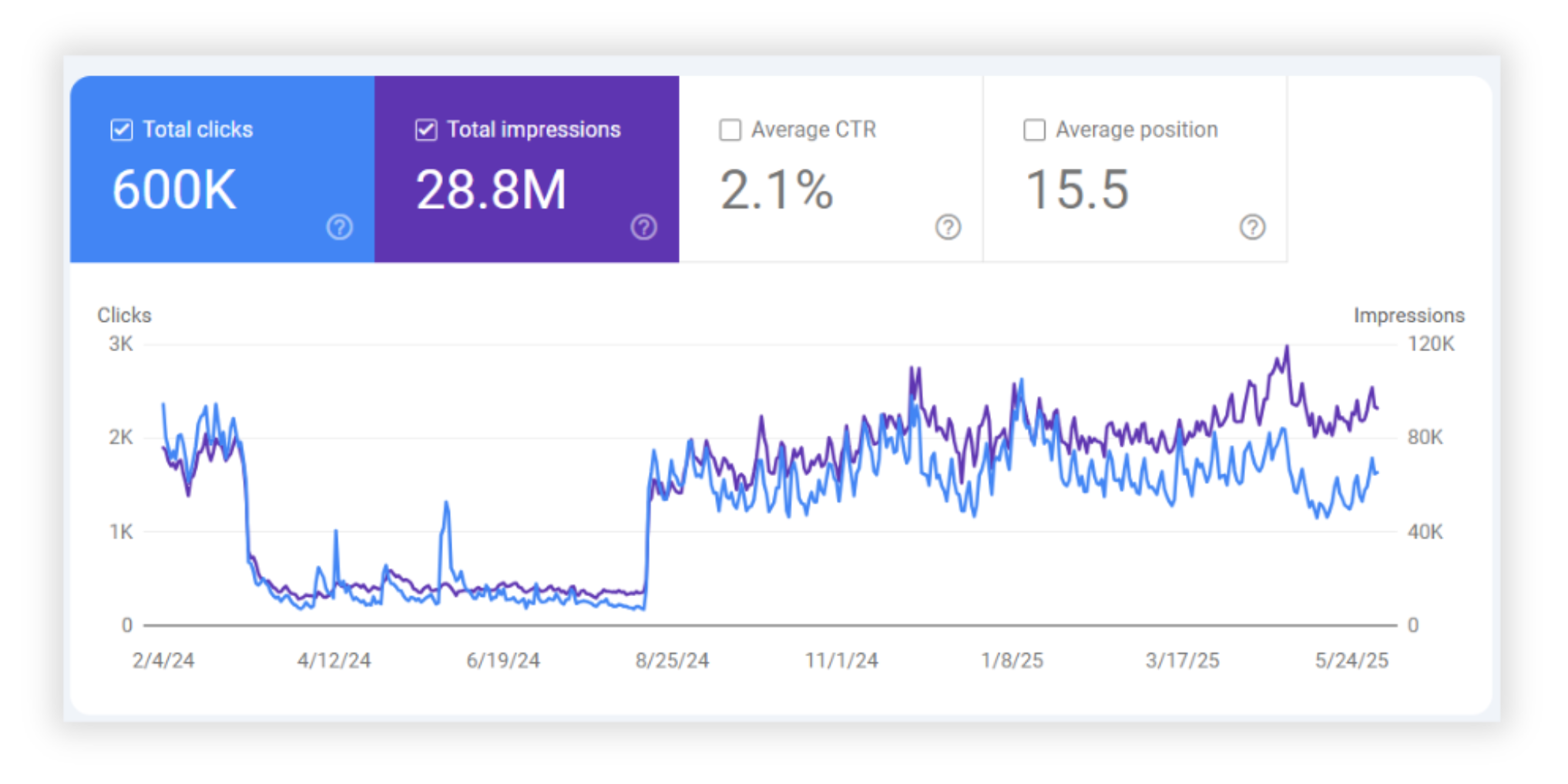
This widening gap between impressions and clicks can be explained by the fact that Google is regurgitating our content as part of their AI Overviews and users are consuming the information without clicking through to visit our websites.
And this is not just us saying it; Google has confirmed as much.
A few weeks ago, Martin Splitt from Google took the stage at Google Search Central Live 2025 in Warsaw and he explained, “Likely your impressions are going to go up if you are shown in AI overviews or AI mode. Um clicks are likely to stagnate or fall a little bit.”
This will only accelerate the death of web publishers at the hands of Google’s carefully planned decisions. And while this happens, Google users could experience a rise in commercial information and defamatory hallucinations being presented as unbiased facts.
If you’re a website owner or web publisher, we want to hear from you.
Please, complete this form so we can add your website to our growing dataset of web publishers being positively or negatively affected by Google’s changes since the rollout of the infamous Helpful Content Update in 2022.
Google has broken the implicit reciprocal deal it made with web publishers
From an intermediary between searchers and websites, to a wannabe all-knowing answer engine.
To use Google’s own words, a healthy web ecosystem needs “fresh and useful content in all the world’s languages” and Google’s role in this ecosystem is to “send visitors to websites small and large through search results.”

As the founder of Travel Lemming, Nate Hake, wrote in his must-read letter to the FTC, “Google created a social contract with the online publishing industry: publishers provide content for Google to crawl and, in exchange, Google sends valuable clicks back to publishers.”
However, what started as a tool that helped internet users navigate the web (and a road through which websites could be found by searchers) is now morphing into an answer engine that, according to Google’s Liz Reid, will function as “an all-knowing friend.”
As the co-founder of Inspired Taste, Adam Gallagher, said in his recap of the latest Google Publisher Meetup in June 2025, “Google is now pursuing two opposing paths, creating a clear division between organic Google, which wants more quality content, and AI Google, which assumes fair use of that content. This model is unsustainable.”
Google wants to have its cake content and eat it too.
Web publishers are the only reason why Google is able to build an answer engine in the first place, but we are now being starved of the very traffic Google loves to boast about sending our way.
The concept of zero-click searches is not new but in 2025 it has become very real.
A zero-click search happens when you search for something on Google and get your answer at the very top of the page, without the need to click or visit any other websites.
This might seem like a convenient way to access information but please don’t take the answer as it comes. Always fact-check and be critical about the sources, especially when looking for information about products.
Watch this video for some excellent tips on how to identify if the product review you’re about to trust should be trusted in the first place.
In the age of Big Tech feeding large language models with stolen information in order to sell you the dream of AI, Alphabet decided to kill its golden goose and, with it, the free and open web that created the conditions for Google Search to thrive.
Now, if you want to get rid of AI Overviews and a good number of Google’s widgets and features, you can use udm=14 to skip the crap and access results in the Web tab without having to hunt for it.
You should also try logging out of your Google account.
While conducting our research, we found that when we were searching for information on Google.com without being logged in, we were served with cleaner results and the AI was nowhere to be found.
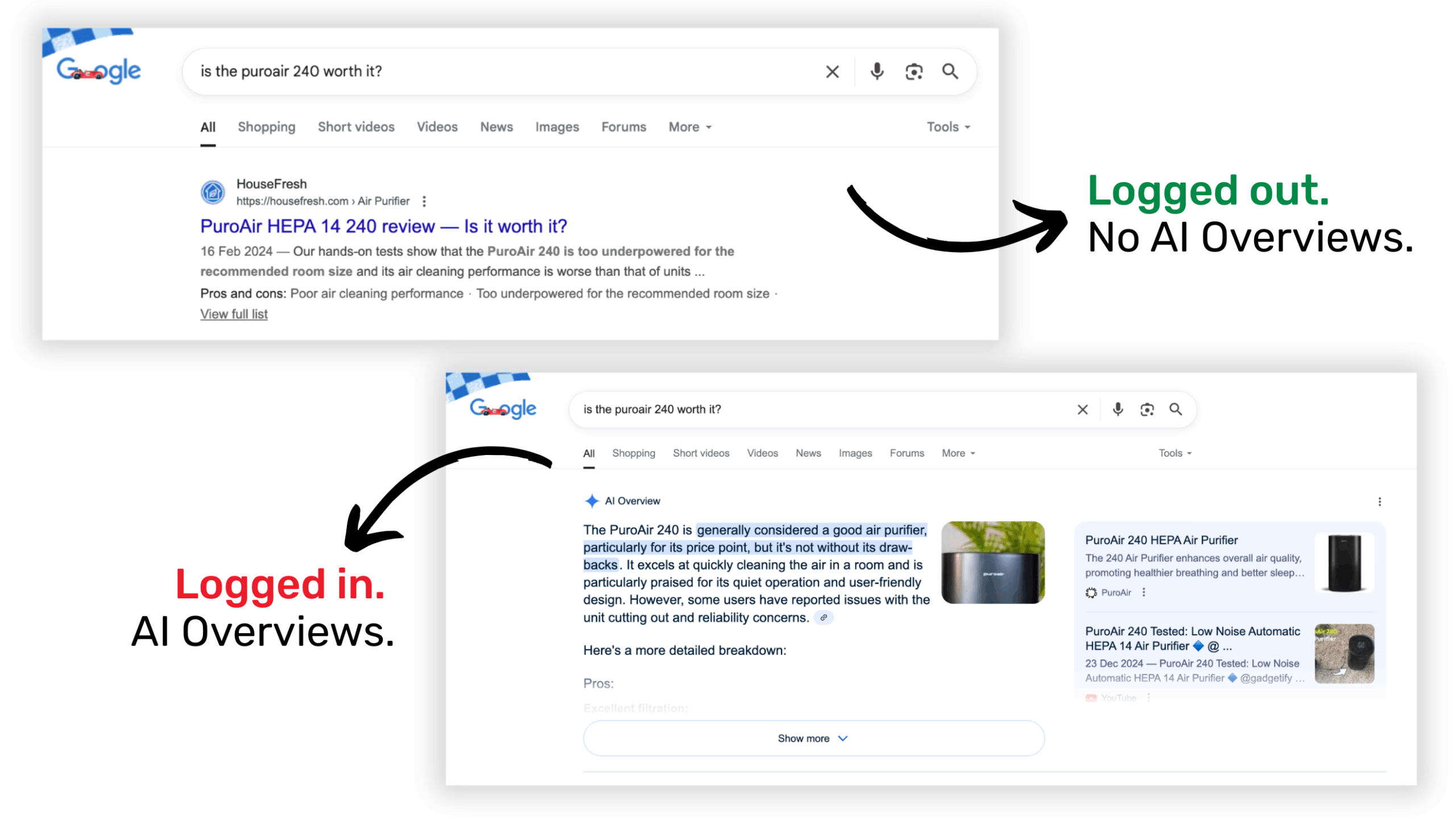
Logging out will also help add a layer of privacy to your searches. You don’t need to be logged into an account 24/7 to use your browser or your search engine—the only ones who need you to log in are Google and the advertisers.
Google has been the search engine by default for many years—partly because it was good and partly because it paid a lot of money to be the default in all our devices.
But there are other search engines, each with its own index and mission. I use DuckDuckGo on mobile and Kagi on desktop, but you might find a different option that delivers the results you have been missing.
Here’s how to change your default search engine:
Web browsers are set as the default just as search engines are.
According to the latest Cloudflare data, Google’s own Chrome accounts for 68% of HTTP requests so it wouldn’t be surprising if your devices have Chrome as a default.
I use Arc on my computer and Firefox on my phone, but there are many other web browsers you can choose from—some more private than others.
Here’s how to change your default browser:
If there’s anything we have learned through the multiple antitrust cases Google is fighting right now is that the company holds multiple monopolies.
That explains why you write your emails inside a Google property, save your work documents inside a Google property, consume video content inside a Google property, keep up with your calendar inside a Google property, browse the web inside a Google property… You get the idea.
Here are a few videos on how to de-Google your life:
Search engines and web browsers are just tools, so use them accordingly.
We don’t know what the future will bring but we know what Google thinks should be our future.
If you made it all the way down here and are upset about the current state of the web, do not go quietly to its funeral. Speak up in whichever way you can. As long as there are people who want to share information with one another, there is hope for the web.





